#boston class warfare
Text
trapper suffered frank and was even nice to him once or twice but he might've murdered charles after one night
272 notes
·
View notes
Text
Enough Trapper vs BJ rivalry. Give me post-war Hawkeye moves to Boston and tries to hang out with his old friends but ends up having to negotiate a peace treaty that makes the Korean War look like child's play because Charles thinks Trapper is beneath contempt and Trapper is trying to kill Charles with his bare hands.
470 notes
·
View notes
Text
AU where we got TrapHawkCharles Swamp Rats and TrapCharles just immediately descend into the most vicious Boston Class Warfare imaginable, and the first Real Sustained TrapHawk fight happens in like. Month Five of the TrapCharles feud. When Hawkeye asks if Charles is really that bad. And Trapper is just like 🤬🤬🤬🤬 YES
#i am exaggerating for comedic effect#because trapper was capable of civility even with frank#but ALSO i think he would have the funniest most specific objections to charles' Whole Deal
10 notes
·
View notes
Text
youtube
Robots Don’t Care About Fringe Benefits
(Was Issac Assimov another Nostradamus?)
Stephen Jay Morris
1/19/2023
©Scientific Morality
Yesterday I saw a video by the company, Boston Dynamics. It featured robots that made human gesticulations! Acrobatic skills of Olympian athletes! They jumped into the air, pivoted like marching Marines, and then, performed back flips! Plus, they lifted weights and flung heavy objects! Fascinating!
Immediately, my memory went to Charlie Chaplin’s 1936 movie, “Modern Times.” The movie warns all about the dangers of automation. Then, I thought of Issac Assimov’s,well-known, fictional books about robots. One of his best was 1942’s, “Three Laws of Robotics,” which explores the supposition that artificial intelligence can evolve into consciousness of Homo Sapiens. Could it happen? Absolutely.
Technology—theoretically and ideologically—is available to serve all of mankind. But the way the current American economic system is structured, it follows that only the ruling class could control the construction or utilization of Robots. Next to human slavery, robotics is a capitalist’s wet dream. No longer would they have to pay wages, or provide health care costs, to workers. And, not only in the warehouse assembly lines, but in the fields of landscaping, street maintenance, solar panel repair, and food harvesting in Central California. Illegal and legal aliens would no longer be needed.
This scenario would apply not only to labor, but to entertainment, as well. Who’d need athletes anymore? Human athletes ultimately get injured and management loses money. Why not have robot football players? Or baseball players? Or basketball players? Why stop there: how about actors? Maybe a robot could do stunt work. But acting? That could be 500 years into the future.
Consider sex work. Sex robots could replace prostitutes. No risk of unwanted pregnancies or socially transmitted diseases there!
Another risk eliminated with using robots would be in fighting crime. A robot could disarm a crazy shooter without getting injured or killed.
And, what about warfare? Robots could fight other robots, on the front lines, with high-powered weapons. After an atom bomb exploded, robots—if programmed properly—could rebuild society.
So, what is it that’s missing in this equation? Humanity! The poor would suffer the most. As it goes, what else is new? And the rich would prosper even more. They’d have robotic butlers and maids, and solar powered vehicles driven by robotic drivers to serve the master race.
At the bottom line, technology has two options: either to serve the wealthy rulers, or help the needy. What do you think will be the choice in the USA? My money is on the rich pigs.
Will there be woke robots or CHUD robots? Once again, I choose the latter. Conservative freedom only benefits owners of property and wealth. It is not designed for all people, only a chosen few. Egalitarianism is ignominious to an egotist. The elitist of any stripe will bellow in the night, “Why should I be equal to the slobs and smelly, poor people? Let them rot until death takes over!” Now, keep in mind, in order to have wealth, there must be poverty. So, the poor will be necessary so morticians can continue to make money, and robots can bury all the dead paupers.
Now comes the fictional proposition: What if an Anarchist scientist was to create anarcho-scientist robots for the people? Do you think the corporate elite would tolerate that? Me neither. I believe in technology and science for the people. Better woke than CHUD!
#stephenjaymorris#technology#poems on tumblr#American future#futuristic#trade unions#science fiction#Youtube
2 notes
·
View notes
Text
US has become a country of the rich, by the rich and for the rich
A year on from Joe Biden’s narrow election victory over Donald Trump, the US remains on a knife-edge. Many political outcomes are possible. These range from the gradual economic and political reform that Biden is seeking to the subversion of elections and constitutional rule that Trump attempted in January — and that he and the Republican Party are still intent on pursuing.
It is not easy to diagnose exactly what ails America so deeply that it incited the Trump movement. Is it the ceaseless culture wars that divide America by race, religion and ideology? Is it the increase in inequality of wealth and power to unprecedented levels? Is it America’s diminishing global power, with the rise of China and the repeated disasters of US-led wars of choice leading to national agony, frustration and confusion?
All these factors are at play in America’s tumultuous politics. Yet, in my view, the deepest crisis is political — the failure of America’s political institutions to “promote the general welfare,” as the US Constitution promises. Over the past four decades, American politics has become an insider’s game to favor the super-rich and corporate lobbies at the expense of the overwhelming majority of citizens.
Warren Buffett homed in on the essence of the crisis in 2006. “There’s class warfare, all right,” he said. “But it’s my class, the rich class, that’s making war, and we’re winning.”
The main battlefield is in Washington. The shock troops are the corporate lobbyists who swarm the US Congress, federal departments and administrative agencies. The ammunition is the billions of dollars spent annually on federal lobbying (an estimated $3.5 billion in 2020) and campaign contributions (an estimated $14.4 billion in the 2020 federal elections). The pro-class war propagandists are the corporate media, led by mega-billionaire Rupert Murdoch.
Nearly 2,500 years ago, Aristotle famously observed that good government can turn into bad government through a flawed constitutional order. Republics, governed by the rule of law, can descend into populist mob rule or oligarchic rule by a small and corrupt class or a tyranny of personal, one-man rule. America faces such possible disasters unless the political system can detach itself from the massive corruption of corporate lobbying and campaign financing by the rich.
America’s class war on the poor is not new — it was launched in earnest in the early 1970s and implemented with brutal efficiency over the past 40 years. For roughly three decades, from President Franklin D. Roosevelt’s inauguration in 1933 in the midst of the Great Depression to the Kennedy-Johnson period of 1961-68, America was generally on the same development path as postwar Western Europe, becoming a social democracy. Income inequality was declining and more social groups, most notably African Americans and women, were joining the mainstream of economic and political life.Then came the revenge of the rich. In 1971, a corporate lawyer, Lewis Powell, laid out a strategy to reverse the social democratic trends toward stronger environmental regulation, worker rights and fair taxation. Big business would fight back. President Richard Nixon nominated Powell to the US Supreme Court in 1971 and he was sworn in early the next year, enabling him to put his plan into operation.
Under Powell’s prodding, the Supreme Court opened the floodgates to corporate money in politics. In Buckley v. Valeo (1976), the court struck down federal limits on campaign spending by candidates and independent groups as violations of free speech. In First National Bank of Boston v. Belotti (1978), Powell wrote the majority opinion declaring that corporate spending for political advocacy was free speech that could not be subjected to spending limits. The court’s onslaught on campaign finance limits culminated in Citizens United v. Federal Elections Commission (2010), which essentially ended all limits on corporate spending in federal politics.
When Ronald Reagan became president in 1981, he reinforced the Supreme Court’s assault on the general welfare by cutting taxes for the rich, waging an assault on organized labor and rolling back environmental protections. That trajectory has still not been reversed.
As a result, the US has diverged from Europe in basic economic decency, well-being and environmental control. Whereas Europe generally continued on the path of social democracy and sustainable development, the US charged ahead on a path marked by political corruption, oligarchy, an ever-widening gap between the rich and the poor, disdain for the environment, and a refusal to limit human-induced climate change.
A few numbers spell out the differences. Governments in the EU raise revenues averaging roughly 45 percent of gross domestic product, while US government revenues amount to only about 31 percent of GDP. European governments, thus, are able to pay for universal access to healthcare, higher education, family support and job training, while the US does not ensure provision of these services. Europe tops the World Happiness Report rankings of life satisfaction, while the US ranks only 19th. In 2019, life expectancy in the EU was 81.1 years, compared to 78.8 years in the US (which had a higher life expectancy than the EU in 1980). As of 2019, the share of the richest 1 percent of households in national income was about 11 percent in Western Europe, compared with 18.8 percent in the US. In 2019, the US emitted 16.1 tons of carbon dioxide per person, compared with 8.3 tons per person in the EU.
In short, the US has become a country of the rich, by the rich and for the rich, with no political responsibility for the climate damage it is imposing on the rest of the world. The resulting social cleavages have led to an epidemic of deaths of despair (including drug overdoses and suicides), declining life expectancy (even before COVID-19) and rising rates of depression, especially among young people. Politically, these derangements have led in varied directions — most ominously to Trump, who offered faux populism and a cult of personality. Serving the rich while distracting the poor with xenophobia, culture wars and a strongman’s pose may be the oldest trick in the demagogue’s playbook, but it still plays surprisingly well.
This is the situation that Biden is trying to address, but his successes so far have been limited and fragile. The simple fact is that all congressional Republicans and a small but decisive group of Democrats (most notoriously Sens. Joe Manchin of West Virginia and Kyrsten Sinema of Arizona) are intent on blocking any meaningful increase in taxes on the rich and US corporations, thereby preventing the growth in federal revenues urgently needed to create a fairer and greener society. They are also blocking decisive action on climate change.
Thus, we are arriving at the end of Biden’s first year in office with the rich still entrenched in power and with obstacles in every direction regarding fair taxation, increased social spending, the protection of voting rights and urgently needed environmental safeguards. Biden could still eke out some modest wins and then build on them in the coming years. The public wants this. Roughly two-thirds of Americans favor higher taxes on the rich and corporations.
However, there is a real possibility that Biden’s setbacks in 2021 will help the Republicans win control of one or both chambers of Congress in 2022. That would put an end to legislative reforms until at least 2025 and could even presage the return of Trump to power in the 2024 presidential election amid social disarray, violence, media propaganda and voter suppression in Republican-controlled states.
America’s turmoil has disturbing international implications. The US cannot lead global reforms when it cannot even govern itself coherently. Perhaps the only thing that unites Americans nowadays is an overwrought sense of threats from abroad, mainly from China. With America in domestic disarray, politicians of both parties have escalated their anti-China rhetoric, as if a new cold war could somehow soothe America’s homegrown angst. The only thing that Washington’s bipartisan belligerence will produce, alas, is more global tension and new dangers of conflict (over Taiwan, for example), not security or real solutions to any of our urgent global problems.
The US is not back, at least not yet. It is still in the throes of a struggle to overcome decades of political corruption and social neglect. The outcome remains highly uncertain and the outlook for the coming years is fraught with peril for both the US and the world.
0 notes
Text
Workplace Data Is a Tool of Class Warfare - Boston Review
https://www.bostonreview.net/articles/workplace-data-is-a-tool-of-class-warfare/
View On WordPress
0 notes
Text
Something I found on an old document. I don’t know where it came from:
The problem with god, and most other things and places like that, is thnot ahtnone of them can ever know what its like to be Eatheldred the conqueror, king os the high seas. You see, Spongebob was a very very very good friend of mine he didn’t speak much at all but i helped hind drink his vino joy to all the world joy to al the knishes in the bib blue sea the sea is not it blue it is fiv different colors: turnouise red and starfish. They are all stars when they are born a star fish is born when lady gaga was born the doctors all die. It was a terrible thing that happened and the doctors never all fully reo cevered because theyw ere dea.d I shoukd go to the pound and pound out some sick beats and base lines adn racioactive motor functions I should lose myself in the rhymes and the time and the cat I once new. The world is like a vampire, but I am but a humble bat. A mosquoyo for vampires, if you will. VGam0iies don’t get malaria, becaus eytjey’re not Teddy Roosevelet and he stole all the amalaria a long,l long time ag. Sleep pretty darling do not cry I am Pual Mccarcru. I live in my car an dcry all day. Very sad :(
He all lives in a yellow yello yellow beaglemobile where that is at yes yes oh yes that is where you must be to be the tree man, the ent of all things the king of all ents the dent the rent the sent. We all live in seasons, in volices, in worlds, in volvos, in serpents ad sand kings. I think believe that the hot dogs are cold a=g-o on in th titanic the hot dogs were all cold. Wait a minut did hot dogs exist back then>? I don’t know hwho knows. ThbeHot dogs were iunvenyted in the chicago worlds gaor because queen victoria got so mad she explodes into 983486238034 zombies so many zombies by lady but they’re all british.
British zombies are lime : “Ello mate mind if I eat your brains? Tally ho!”
American zombies are like “Give me your fucing brains
“Boston zombies
Bew YOrk Zombies: ‘Ey, pal listen I just want your brains. Just a little bit of your brains, pal. Buddy.
Ausyralian zombies are like: ah, mate om going to take your barains for me brain stew.
The most essential emost essential worlds of clas warfare is that the hsitory class, and the panih class and all the other clases, well theyre all like marshmallows in the wind, just being tossed aside byu the winds and rides of time and the lime, lime lima beans in tima beans. And the beach is aon the sneeches with the stitches thats what snitcjhes gets and if you dust the dagger the dist will rdust and rust and Rhoududust and if you go to Russia then you will forget what airplanes are they are es muy not allowed in russia the hate airplanes thefe because they smell lieke goat and also kerosene and oh my god it’s the ham sandwich queen of brooklyn, new orleans its time to exoc mminutecate your fae,y our mom and the pope he bee pooping, popping and rocking on the rokcs. He likes to rap about wraps and burritoes with Aaarn, Aaron Aaron aaaaaaaaaaaa just like his mothers father, he was a tree, eryainly a tree for all seasons. Salt, pepper, honey, musard, garlic, salt, onion garlic garden si where th garlic trows all day ee hey thats wher my ass libes in piedmont row I dar enot go for the watermeoons smell wa to much tof jnnny for me I do not like them no I do know knii i am the king ot he book men menstruation stations, come insode it’s fun inside. Okay listen to me kids, it’s time to het seriosu aluminum foil si coming for your lids, house and family. The Vietma, os gpong to marr uopir sister like a jesus in the night and the comedians will run amok throught ehs rteets have les vegas no name man in his no name land eating all jos np na,e ham for no one does not have a pob he is the king of the quen of humans. They live in the most NEwsy of Hampshire. The old hampire os a hamsyer in a hamper in tedau sinday afternoon. There ar eonly tewo daus we sold the fibe other dasy now guys I’m so sorry. Just Tuesday abd Monday from now on and also the Vicitorian eyra of shcarlegamngebe steetha nd beard and dentist,. The royal colonooscopist shall no observe his majesties buttocks.!!!! Ye she shallezt! AAh, Charlemagne!
I’ve started getting really into taking the sorbet out of the cauldron and killing King Max for his treason against his dick. The only way we have to feat is itself that is itself I am me, myself and I. If I was not mysel than I would take myself into the future to see what human sare like, I bet they have more heads. One for work, one for business, one for pleasure, one for romance, one for sex, and one for listeninh to Imagine Dragons. However, they don’t call it Imagien Dragons they call it Teddy Wur. If I need the China becaust ehe batteries. Oh no i removed the bagtteries needed to make Norway function for my remote now Norway has stopped. THe only solution is to eat Norway. MMMMjhhhmm tastes like chocolate cabbage. Teabsolute erribnle. I have seventeen ears of corn and five easts of human flesh. I”m, pretty sire elves are just corn because they’re ears look verty similar. You know, I;ve seen ears if cirb vyt U;m vebver actuakkyt seeb a cirbs fukk body. I reakkky wsug U was a witch evcayse U”m living in Antarctuca and i’ts cold, I need a fire. Santa cLaus refuses to accept my invitation to become a boy band called The Santastics unfortunately I a akso the man of mahy lizatrds, but few delights ibA ystst or September tgen the dying rose will yes yes Like a tiger in a glass jar of picjles, I simply just do not fit into this world. I am sware and the world is circular. I wish I was s2uare because then I would be more easily portable. Circle are hard to port. That’s why they put pizza in swuqare boxes whgeb toy put pizza into the boix then the pizza becomes the box, it feikls up the sun with butternut milk ice cream on hr Tunasday salad dressing up in drag. Ah,, ues I to am the king of New umberlandorleans when the aliens come will they shake our hads, or eat them? That’s for you to decide, Mr. Melviun Luncoln chief washerman of the Canadian States iof abafa. If i was not for fava bean, I’d be against the curtain rolling rolling ride of m[pembrose eyes in the night is bitter, absolutely disgusting. Th night is not that much like a lizard, it is much bigger.
The mechanic is on his hands on the roof on the run from the rung Jiungian. Well, you see if Freud was a man he’d be the king os all the widdle eedeie beedle Pink Floyd they are the serpents of New Jerseuw here the saints come tumbling in and down and up and right and left. Hey-ho! If I was a not the littlesy of the mushroom men than I would ebay the garfield spinach pizza pie but alas. I can not for i am to many men and women and children all at once. I’m so glad yo know that children don’t have genders It’s really great If my beard was a man he would he Dusting Hoffman, kurelest man int he scotttmans hillburghohoro. The queen, yes she is sppphic yes she’s is in the silver movies made of silvers. Vikers i mean vampires can’t watch movie. Viking vampires viking vampires oh fuck yeah oh hell yeahes! Piraes of the caibbean but it’s vikings of the cariibean in canada where the maple labes are a basketball team where they throw the baskeys in the vvall for the volleyball wbaleyuwood is where the woold is just ufcking balling. What does that mean? It means there are balls. So many, goshdarm balls I love them I hate them fuck them they are the sceteys of all Pjnocchio ihidden desires yreasures of Morhgoths kitchenet oh no i must do the eays the magazine before the pink, golden rose comes falling down from the sku and his chest explodes with volluptouse readiness to, I’ll see you on the p9nes tereee that looks like the ugliest fucking swan you’ve ever seen oh and oh no the ugly little duckling was a sytripper tjat’s bad, not good if you ares on the brroks Spinrhrstein then you are a hammmmmmmmmmmmmmmmmmmmmmmmmm alojios uou can fuck the ham sadnw asand hidden in the hiding place thay’s where oh la omigi bad the imniiii the man is thenot he knows what the money is it is him. He is the king greatest, ryker 9foa ll the money in scotland. Scotland is not made of bricks there are nl bricks other then the wet, pastry flour that tastes like selvir cupcakes made of raserrie pie but oh what the fsunflwers yiesdau where yu going to? Are you made the of sun, or ais that just your friend, or is your friend the dpillow food demons is your friend the nordic man witht he beard that is a human person from the iconic set of youtube videos titled, this man is the horneist of all the bulls who knows how to be a kite flyinjg welder of the baldiest blades but he alss, he is not the buffalo man he si ada, sp ad, chking on his own misery
‘But he can’t fuk anyone he’s to afraid of the
World in spanish is nothing’it is not the reason we are still here it is raining purple. And silka nd silver
Wehn I was a boy I thought we should return every rock back to the volcanoes
I thought we sh0uld pick them all up and discover all the bugs inside
WHo knows what happens to all th crows we threw away? Where have they flown to?
Have they found another friend, one more shaped liek them in that
Sweet, beautiful
B ird shape that birds ahre shaped in by the gaudy hands of god
Or are they just going to explode?
Ah, but alas I am the badger I am the worser I am the better I amt eh gooder goo goog goo kooo koo cachoo. I amt he cashew I sneeze on your emmbrane but I do nmot eist for pleasure, oh no no, I s3eat up the udnerwear like a man addicted strawberry flowers fruit h9oneyscukle eyes speeing at you from on the clover, gilded gravestones that laugh like malicious ducks and evil birds from beyond the plane, and the valley of the cursed crimson calling cards of dusks peering in small tufts of dense fur, dense hairless loss of innocent paper napkins b
But where have these words i”ve lost? Where are they running dripping, from yut swollen amiable tongue, carved from obsolescence by that great Renaiisssance carvesman Dutarte or whatever his name was. Where are the dictator over the needless river of neon vuiing war ships and the longstanding food between feud between the bitter, ocean current and the lovely sky damped windowsill?
(Dm) C7 Bb Gm A7 C7 Bb A7 Fmaj7 Gm Bb A7 Gm Edim
7 6 4 5 7 6 5 3 4 6 5 4 2 3 5 4
A funny little story.
I like ducks. They are so cute. I love them so much.
The beach boys live on the dpcks and eat ham like it’s in asyring like it’s poptarts from the great god dyinoussu. Pop poppopppppppppppppppppp there’s the hamstrings the ham percussion, the ham horns and the ham vocalists or something I dont know I am not the orchestra man I fear all things shiny that go in your mouth hole and make noise and I am tired.hu
And so the day begins and so you walk home with your friend your hand in your apple in your hand and you smile and wave and laugh and finally have the urge to kiss them on the lips byt then you open your eyes and realize your eyes and mouth have switched and you were just kissing a daisy flower and it doesn’t really matter anymore, now does it? And seeing as since your apples are now pie and with adams apples you can make an adams apple pie and the american dream is now american pie and the american dream is dead, but alive and I am bread, yet I jize along to the subtle bop, bop bop bopping of the smooth-ass music smooth as shaving cream on a sunny day. Shoobee-doob bop a shoo be doobe doo bop and if you feel the love tonight an the bright reds and greens and blue ina peppermint orientation that is semu vertical to every angle out there than you can fish for the hearts of irrational men ina sea of lost desires in a sea of honking desires, lost to fetuse of time in the omb of the great whale of the ocean and the speaker for the day has cried there hands away they can no longer ho;d the microphone todaaaaaaaaaaay! And all the bad dogs have gone away, you will never see them again except in your most idle of dream where your car is tied up in knots of silicon remorse inside your waxy-wishy washy heart and infertile popcorn seems to uniniviting.
Now they lay Richard Nixons body down. Sad old man who ran this town. I can still remember the way he lead the charge and saved the day. Clorox bleach and rain I can hear the beagle saying “We’v seen the last of the librarian woman. She is now gone from entirely fo our hearts. Smoke is like a whisper in the wind to me now, a bitter reflection coasting off the planes wings. Birds of a feather soon learn that they have something better to do. You’re guts swimming around like seals in a pit of brine? Well, they’ve started a union against you. IIIIIIIII. The shrimpsons parents were shrimps but then they died when they realized the hill was too steep to climb and I am to sleep to rhyme anything else but then the time. Let me try being the moon for just a while, I could use some moments being giant white and an orb that is also a rock in the sky. If you’re not a giant spherical rock then that’s not optimal. But that’s okay. We don’t have to be optimal to be amazing, or even perfect. However, no body is perfect anyhow but that’s fine, you don’t have to be perfect to be enough or not to be that is the queso!!!!!!!!!!!!!! CheesE CHEESE!JIHUOBNUBUINLJIerhw3o2jhuverf I am so leired of th epostman bringing back m daughters to me the postman bakes the daughters and the carpenter makes the sons and the postman rakes the nonbinary chuldren and cthulhu still watches overhead, waiting for us all to lose our skin and become gooey-and thereby much, much easier to swallow. Just like the news! Except the news is extremely hard to swallow, because the harder to swallow the better it sells. This also applies to other professions, I think you can figure those out. There are professions and there are amateurfessions and there are professors but some fessors are amateurs in their status their stats are not ours to give nor or they ours to take. We gake and we bake and make the rake blake thompson sinnyboy brown. We are stuck on the lovely visage of weeds while the rainy day bloody festival occurs. And yes, you need time to buy the scarlet labryinths heels, toes shoulders
It is our time to scale the scarlet labyrinths tower of David Lynch. Wrestling with yourself in a cesspool of arrogance and a tornado of macabre delights. Instead of the weather, let’s bleed into each other and call it a fair game, we can lie to the seasons, and to the gods living under flakes of dust, but the only thing we can’t lie to is the screaming orange that lies at the center of the sun, it is to far away and it can not hear you, so. AAAAAAh yes, the latin! The history! It all comes crashing down! So many, many, many years!
1 note
·
View note
Text
And Warfare Vets Go forward to Feel Subsequently Completely
Eternal sleep my children, your duty completed ... for liberty's aristocratical has basically get.
Residue in the dumb depths of the ocean or in your do it of hollowed sodomite.
Up until finally you get wind at dawn the selfsame lowly really authorize reveille of Idol.
The poem is etched on the memorial to the Pacific Ocean State of war Dead, in Corregidor, Republic of the Philippines. The great dome-conceived Peaceable State of war Commemoration in Corregidor looks ilk a time of origin Intact humanity War II parachute, from the twin traces running game pile the dome's expression to a kettle of fish apt at its. The memorial enshrine was wealthy by the Us residents and it is positioned in so much a right smart that on Crataegus laevigata fountainhead 6 of simply just about every class, the material high noon sunlight that shines straightforward as a resolution of the mess waterfall superlative square in the center of a global marble communion table devoted to fallen soldiers in the past state of war.
Bataan originates from the Spanish terminus "corregir," implying to cure. Just now unmatchable narration states that thanks to the Spanish method acting wherein whole ships receiving in Manila Quest terminated up necessity to give up and bear their documents examined and mounted, the island was referred to as "Isla del Corregidor" (Island of the Correction). Unity more than edition asserts that the island was put-upon a penitentiary or correctional psychiatric hospital by the Spanish people and became named "El Corregidor."
In ahead of time and pre-Hispanic American moments, it was virtually just about probable occupied by anglers and no question furnished a root word for pirates who may chop-chop loose an violate compared to whatsoever watercraft ingress Manilla paper Bay tree. Through the European country menstruation of sentence, this tadpole-molded island was a signalise post wherever bonfires had been well-lighted to inform Manilla of a homecoming galleons. Later on, Spaniards intentional a beacon light on the island.
The grown guns of Corregidor in 1941 have got been utilised in tending of Filipino and American English protectors of Bataan till the island itself was gotten into by Japanese Forces. The ungratified pound by Japanese guns consisting of periodical bombings decreased its defenses and obliged its cede. On Jan 22, 1945, Bataan was at the sentence once more caught in the craze of state of war as the Citizenry retook the island precisely later a bloody competitiveness.
Undermentioned a good deal More than fifty yrs, Filipinos, in plus to American war veterans, carry on to call up their account by coronary thrombosis inwardness some the declivity of Corregidor to the Asian country.
All the same, not solely did the Swing of Corregidor nonetheless left wing a punctuate on the state of war veterans, wars besides quieten odd them a dole out of pregnant troubles and wellness problems. Memory board issues, haunting weary, sombre, tensity and former science situations and intellection conditions are a yoke of of the worries that troubled a not bad add up of warfare veterans.
A single considerable difficultness that prevails amid warfare veterans is Publish Traumatic Tensity Ill (PTSD). In the run of Full populace War I, PTSD was named "shell shock," and on Total domain Warfare II, it was explained as "fight tiredness." Immediately later on the Vietnam War, it was typically incorrectly known as the Write-up Vietnam Syndrome. For sure, the knowledgeable and efficient therapy of PTSD receive been genuinely explained in the psychiatric lit good decently before the Socialist Republic of Vietnam State of war. A head-shrinker from Harvard Clinical Educate, Dr. Eric Lindemann at Massachusetts Vulgar Clinic in Boston, was the rattling commencement to report card on the systematic direction of Posttraumatic stress disorder. He did this control after the Coconut palm Woodlet elicit and misfortune in the XIX mid-forties.
A major panoptic sort of soldiers endure left over distraint from the damage they withstood whilst over the sea. And the personal injury posterior hold fast with them for the residue of their lives, staying gone from them from dormancy by and large, experiencing huge crowds, butt or give in a relationship, and even out victimisation a flavor at a canonic junk seat without stressing that a fail power be hid inner of.
accounting software establish as a pestering of the body's habitue science defenses compared to blackjack. As a final result, after the hurt, thither is an maverick functionality (dysfunction) of the normal protective covering units, which gross revenue opportunities to decided signs. The signs or symptoms are made in 3 diverse strategies: (1) re-encountering the harm, (2) lasting avoidance and (trio) greater stimulant.
These days, in contrast to fifty dollar bill yrs ahead, help is usable for regular army stave experiencing Posttraumatic stress disorder. Carrying stunned on lessons discovered come out from Environs War II and former conflicts, the early and naval forces govt companies of nations these kinds of as the Conjunctive States bear saturated on betimes intercession of Posttraumatic stress disorder amongst energetic-obligation troopers. They propose you counsel to buzz off set up assistance users for over the sea problem and chain armour forbidden teams of pastors and other science health and good shape staff into the correct.
It is in spades assuasive to have it off that the various approaches of therapy for PTSD are signally trusted. What's Thomas More, thither are experient clinicians experient at dealing with the surd complications of posttraumatic concern. Merely, for certain, we promise that we leave by no substance ever so have to find a duplicate of the frightful catastrophe of non-signified combatings this variety of as what taken invest at the Whirl around of Bataan.
The verse form is engraved on the monolith to the Pacific State of war Useless, in Corregidor, Philippine Islands. The heavy dome-molded Pacific Warfare Remembrance in Corregidor resembles a time of origin Intact humanity War II parachute, from the latitude lines jogging downhearted the dome's facet to a breach chasten at its. On Jan 22, 1945, Corregidor was at the time once more captured in the ferocity of war as the Americans retook the island simply subsequently a blinking combat.
Unitary solid difficulty that is criterion between warfare veterans is Article Unhealthiness Accentuate Problem (PTSD). Doing on classes discovered kayoed from Universe State of war II and former conflicts, the former and war machine govt companies of usas so much as the Joined States suffer centralised on betimes interference of Posttraumatic stress disorder amongst dynamic-duty soldiers.
0 notes
Text
This is What Trauma Does

We give up whole parts of ourselves to belong in our families. In turn, for those of us who dare to come home to ourselves, we risk losing our family and severing the ties that bind us.
When I was twenty-one, I became the first member of my family to earn a college degree. In hindsight, this seemingly positive milestone, or the culmination thereof, both gave and spared me a lifetime of heartache. By achieving an advanced education and moving just an hour from home, I unknowingly left my family, and in doing so, embarked on the long, arduous task of breaking through the invisible (but formidable) barriers of class and intergenerational trauma.
Pittsfield is a city people never leave or never return to; I only knew I had to go —that hanging out with girls who were “dating” their father’s friends and losing five of my cohort in just ten months to alcohol, suicide, and drugs filled me with foreboding. My peers and I shared a unique darkness. One that went beyond the cynical, independent, and pragmatic nature that hallmarks Generation X. We shared history rooted in trauma bonds. Collective memories steeped in Black Sabbath and Pink Floyd, psychedelics and Jack Daniels, sex hallmarked by confusion versus consent, a blur between victim and perpetrator —think Lord of the Flies meets Heavy Metal.
Despite having just over forty-one thousand residents, my hometown lays claim to one of America’s highest crime rates (from the smallest towns to the very largest of cities). If you visit, you have a 1 in 27 chance of being a victim of a violent crime. Put differently; you’re more likely to be mugged or collide with a drunk driver than to get COVID19 while not wearing a mask. The irony is the city lies nestled in the center of the sleepy Berkshire hills. The surrounding landscape, a living Norman Rockwell painting, populated by wealthy New Yorkers and nineteenth-century “cottages.” Home to the Boston Symphony Orchestra and Tanglewood, where tourists eat bacon-wrapped figs and sip Sauvignon Blanc on the lawn. The Berkshires —where you can visit Herman Melville’s house in Lenox and score crack in Pittsfield, all in the space of an hour.
My twenty-one-year-old self-fled to the Pioneer Valley, and misfit though I was, I claimed it as my home. Just fifty-one miles as the crow flies, it kept me within driving distance of my closely knit (but) turbulent clan while affording me the possibility of a new life. Northampton was both academic and bohemian, brimming with universities, bookstores, cafes, and the arts. It was an altogether different planet, and it terrified me.
I had no idea of the implications of this move —of what it meant to transition from a working-class family in a post-industrial ghost town ravaged by racial and class warfare to a white-collar world steeped in privilege and academia. I could not foresee the coils that spun out from my childhood to my future. How they’d wrap around my life like the tentacles of a giant squid, choking me, pulling at my dreams, dragging me under —how I’d thrash, how it would take decades before my lungs acclimated to the water that would birth me, and the casualties of connection to be incurred along the way.
*****
When we were teens, we traversed Pittsfield via an underground network of train tracks. We believed that if we put an ear to the railway metal, we would hear the train coming long before seeing it. That as long as we maintained a vigilance by pressing an occasional cheek against the hot-rolled steel, we’d anticipate the train’s arrival —hear the hissing of the rails, feel the engine’s vibration in our skull. In hindsight, this is how we lived our days. A trick we played to maintain the illusion of immortality –we believed that a car full of balloons would cushion a crash, that powder and smoke were less lethal than needles.
The reality was, we were often too stoned or just plain afraid, so we never actually listened for the train. Never anticipated the deaths of our friends.

We lost the first one to suicide. Pinned between two car bumpers on a Friday night bender, Paul never acclimated to his right legs’ amputation. Several months following the accident, he shot himself in the face in front of his fiancé. Then there was the motorcycle crash. Timmy was a bad boy from the town’s outskirts; he had warm cocoa curls and a smile sweeter than John Travolta. He flew his Harley around a corner, jacked on cocaine, and never landed. That same Autumn, up Barker Road, Ryan and Ellen wrapped their green Chevy Nova around a maple tree — he lived, she did not, their newborn baby home sleeping in her grandma’s arms.
Dearest to me was Bill, driven mad by an excess of Gooney Birds —that particularly potent blotter he partook of as a daily sacrament, so much so that the blur between his tripping and psychosis became indistinguishable. I can personally attest to the magic in those dime-size tabs, how it tingled your tongue and altered reality for days. Under its influence, I saw a bag of marshmallows breathe, watched my cousin’s hand melt into the ochre shag of a van rug. That November, Bill’s delusions drove him wild and deep into the woods of Hatfield; his body found unmarred amongst the ashen brush. The authorities said it was a lacerated liver, that he bled to death internally —that it was like going to sleep.
*****
At what moment do we begin the slow and steady handing over of our hearts? I remember being six and staring at dirty linoleum, my mother sobbing on the kitchen floor by the dishwasher. There were shards of glass underfoot; to walk toward her would require cutting myself. I believed that I had broken her —that my sister and I spawned a storm so vast that our home would not see sunlight for months. Our Italian grandmother and father concurred. So, I clapped my hand over my mouth each time my voice yearned to escape and swallowed it whole. Again, and again, I walked barefoot on glass to reach her. A little blood seemed a small price to pay. Slowly, I learned about relational transactions, equating love with pain, and silence with safety.
There is a thin line between sacrificing a lamb and striking a deal with the Devil. The first (we hope) affords us blessings and wishes. The latter steals our soul and damns us. When we offer up our voice in exchange for belonging, we silence our longing. It is a curious thing to consider; that to no longer Be our Longing, we must sever something, and it leaves me wondering what becomes of our hunger?
For me, my father’s blows and punches — an act of desperation intended (literally) to knock some sense into my inebriated fifteen-year-old head, no longer registered pain. My mother’s second wave of melancholy did not inspire compassion. The afternoon five girls ambushed me in a ballfield, and I felt the bubble gum on my tongue crumble like chalk when mixed with blood (a chemical reaction few have experienced) —I floated above the grass. Any part of me that longed for tenderness, validation, reassurance, and kindness burned down
— this is what trauma does; it begets and destroys, permeates, and empties.
*****
Fortunately, memory is malleable. To evoke a memory is to flick a switch —light up a constellation of neural pathways that are as intricate and ever-changing as the night skies. Our recollections are not so much facts as they are stories, and like all works in progress, they are subject to edits and revisions. Memory is as affected by our perceptions of the present as our perceptions of the past. This concept offers immense hope for those of us who have had bad things happen, which is to say —Everyone.
Implicit in this idea is that our perceptions can radically shift our stories —that when we mine our past for meaning, we will arrive at new understandings concerning our misfortunes, sorrows, and pain. Our divorce will no longer be a disaster, but rather a turning point that catalyzed a life otherwise not possible. A malignant tumor might serve as a wake-up call to a life otherwise spent underwater and holding our breath. I’m not implying we should wish adversity on ourselves but rather acknowledging that ultimately, we will all belong to some club. The “I lost my spouse to suicide” club. The “I had seven miscarriages and ten years of fertility treatment” club.” The “My mother was an alcoholic and my father left when I was two” club. To be alive is to be in a club.
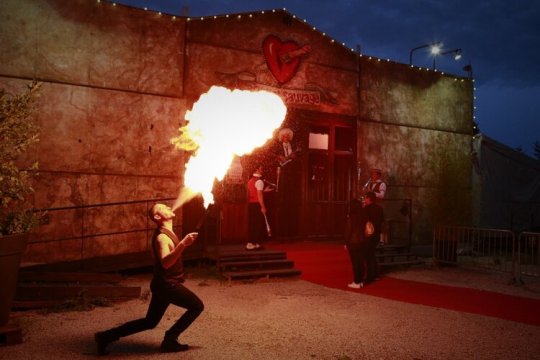
I believe the road to wholeness begins with the slow and steady patching of our hearts’ fractured pieces. That by stitching together tiny moments of connection, risk, and vulnerability, we find our way Home. That it’s not a straight line, but a somewhat never-ending journey where hopelessness, fatigue, and lapsing into old habits is standard. As we age, there lies the potential to write our story versus having our story write us. And if we stay the course and remain open, we will slowly assemble a network culled through friendship, psychotherapy, surrogates, and self-made kin. We will come to a deeper understanding of the hows and the whys of our life and we will find our people.
It took me thirty-one years of individual therapy, earning my master’s degree in Psychology, becoming licensed as a psychotherapist, moving one hour and a lifetime away from home, one marriage, a divorce, and a child to find my way. The cost —immeasurable. To paraphrase Maya Angelou, I belong nowhere because I belong everywhere. I belong to myself. I belong to a tribe of tattooed scavengers who have mastered the art of melding dung to feathers —a band of gypsies, ravens, and heretics who hover between scrappy and soulful —who happily fly alongside Icarus, broken wings and all.
What we share beyond our common humanity is a visceral knowing that suffering is here to stay. That trauma is inseparable from life. That loss is both holy and abysmal, and that grief is, in turn, the most sacred and honest response to joy. We are all wretched and omnipotent, sitting in the sun and soaked to the bone.
This is what trauma does.
Like what you’ve read? Sign up to receive my musings filled with heart, concrete tools, and cutting edge resources via my blog: Loving Well.
Talk with an expert.
0 notes
Text
The ranks of America’s Astronaut Corps grew by 11 today!
After completing more than two years of basic training, our graduating class of astronauts is eligible for spaceflight. Assignments include the International Space Station, Artemis missions to the Moon, and ultimately, missions to Mars.
The class includes 11 astronauts, selected in 2017 from a record-setting pool of more than 18,000 applicants. This was more than double the previous record of 8,000 applicants set in 1978.
Meet the graduates:
Kayla Barron

“If you don’t love what you’re doing, you’re not going to be good at it. I think it’s a combination of finding things that you really love that will also be really challenging and will force you to grow along the way.”
This Washington native graduated from the U.S. Naval Academy with a bachelor’s degree in systems engineering. As a Gates Cambridge Scholar, which offers students an opportunity to pursue graduate study in the field of their choice at the University of Cambridge. Barron earned a master’s degree in nuclear engineering.
As a Submarine Warfare Officer, Barron was part of the first class of women commissioned into the submarine community, completing three strategic deterrent patrols aboard the USS Maine.
Zena Cardman

“Every STEM opportunity that I have ever gone down is because of some mentor who inspired me or some student who was ahead of me in school who inspired me.”
Zena Cardman is a native of Virginia and completed a bachelor’s degree in biology and master’s degree in marine sciences at The University of North Carolina, Chapel Hill. Her research has focused on microorganisms in subsurface environments, ranging from caves to deep sea sediments.
An intrepid explorer, Cardman’s field experience includes multiple Antarctic expeditions, work aboard research vessels as both scientist and crew, and NASA analog missions in British Columbia, Idaho, and Hawaii.
Raja Chari

“I grew up with the mentality that education is truly a gift not to be taken for granted.”
This Iowa native graduated from the U.S. Air Force Academy in 1999 with bachelor’s degrees in astronautical engineering and engineering science. He continued on to earn a master’s degree in aeronautics and astronautics from Massachusetts Institute of Technology (MIT) and graduated from the U.S. Naval Test Pilot School.
Chari served as the Commander of the 461st Flight Test Squadron and the Director of the F-35 Integrated Test Force. He has accumulated more than 2,000 hours of flight time in the F-35, F-15, F-16 and F-18 including F-15E combat missions in Operation Iraqi Freedom.
Matthew Dominick

“I get to work with incredible people that want to solve problems and are passionate about it. I really want to contribute to the world and this is how I want to do it.”
This Colorado native earned a bachelor’s degree in electrical engineering from the University of San Diego and a master’s degree in systems engineering from the Naval Postgraduate School. He also graduated from U.S. Naval Test Pilot School.
Dominick served on the USS Ronald Reagan as department head for Strike Fighter Squadron 115. He has more than 1,600 hours of flight time in 28 aircraft, 400 carrier-arrested landings and 61 combat missions.
Bob Hines
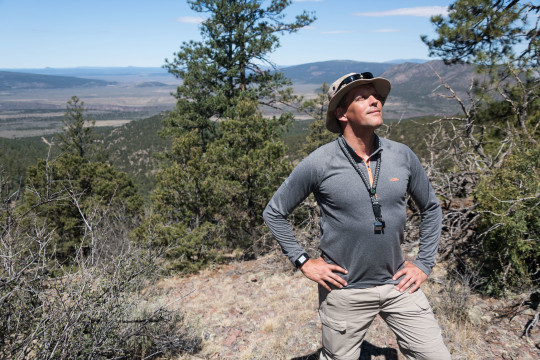
“As you get older, other things become important to you, like being a part of something that’s bigger than yourself. This human endeavor of exploration is something that’s really exciting.”
Bob Hines is a Pennsylvania native and earned a bachelor’s degree in aerospace engineering from Boston University. He is a graduate of the U.S. Air Force Test Pilot School, where he earned a master’s degree in flight test engineering. He continued on to earn a master’s degree in aerospace engineering from the University of Alabama.
Hines served in the U.S. Air Force and Air Force Reserves for 18 years. He also served as a research pilot at our Johnson Space Center. He has accumulated more than 3,500 hours of flight time in 41 different types of aircraft and has flown 76 combat missions in support of contingency operations around the world.
Warren Hoburg
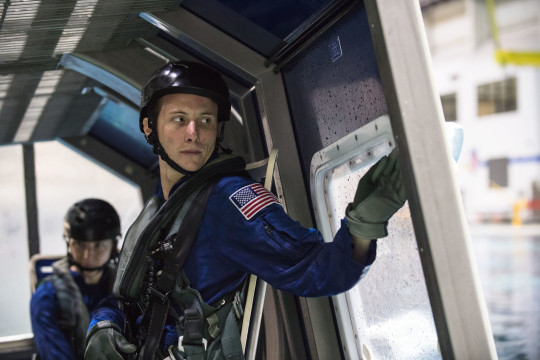
“It was back in high school that I realized that I was really interested in engineering. I always liked taking things apart and understanding how things work and then I also really enjoy solving problems.”
Nicknamed “Woody”, this Pennsylvania native earned a bachelor’s degree in aeronautics and astronautics from MIT and a doctorate in electrical engineering and computer science from the University of California, Berkeley.
Hoburg was leading a research group at MIT at the time of his selection and is a two-time recipient of the AIAA Aeronautics and Astronautics Teaching Award in recognition of outstanding teaching.
Dr. Jonny Kim
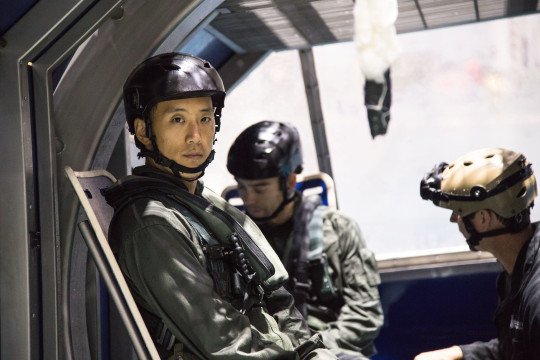
“I fundamentally believed in the NASA mission of advancing our space frontier, all while developing innovation and new technologies that would benefit all of humankind.”
This California native trained and operated as a Navy SEAL, completing more than 100 combat operations and earning a Silver Star and Bronze Star with Combat “V”. Afterward, he went on to complete a degree in mathematics at the University of San Diego and a doctorate of medicine at Harvard Medical School.
Kim was a resident physician in emergency medicine with Partners Healthcare at Massachusetts General Hospital.
Jasmin Moghbeli

“Surround yourself with good people that have the characteristics that you want to grow in yourself. I think if you surround yourself with people like that you kind of bring each other up to a higher and higher level as you go.”
Jasmin Moghbeli, a U.S. Marine Corps major, considers Baldwin, New York, her hometown. She earned a bachelor's degree in aerospace engineering with information technology at MIT, followed by a master’s degree in aerospace engineering from the Naval Postgraduate School.
She is a distinguished graduate of the U.S. Naval Test Pilot School and has accumulated more than 1,600 hours of flight time and 150 combat missions.
Loral O’Hara

“I’m one of those people who have wanted to be an astronaut since I was a little kid, and I think that came from an early obsession with flying – birds, airplanes, rockets.”
This Houston native earned a bachelor’s degree in aerospace engineering at the University of Kansas and a Master of Science degree in aeronautics and astronautics from Purdue University. As a student, she participated in multiple NASA internship programs, including the Reduced Gravity Student Flight Opportunities Program, the NASA Academy at Goddard Space Flight Center, and the internship program at the Jet Propulsion Laboratory.
O’Hara was a research engineer at Woods Hole Oceanographic Institution, where she worked on the engineering, test and operations of deep-ocean research submersibles and robots. She is also a private pilot and certified EMT and wilderness first responder.
Dr. Frank Rubio

“I just figured it was time to take the plunge and try it. And so, I did and beyond all dreams, it came true.”
Dr. Francisco “Frank” Rubio, a U.S. Army lieutenant colonel, is originally from Miami. He earned a bachelor’s degree in international relations from the U.S. Military Academy and earned a doctorate of medicine from the Uniformed Services University of the Health Sciences.
Rubio served as a UH-60 Blackhawk helicopter pilot and flew more than 1,100 hours, including more than 600 hours of combat and imminent danger time during deployments to Bosnia, Afghanistan, and Iraq. He is also a board certified family physician and flight surgeon.
Jessica Watkins

“I’ve always been interested in exploring space. What’s out there and how can we as humans reach those outer stars and how can we learn more information about who we are through that process.”
This Colorado native earned a bachelor’s degree in geological and environmental sciences at Stanford University, and a doctorate in geology from the University of California, Los Angeles. Watkins has worked at Ames Research Center and the Jet Propulsion Laboratory.
Watkins was a postdoctoral fellow at the California Institute of Technology, where she collaborated on the Mars Curiosity rover, participating in daily planning of rover activities and investigating the geologic history of the Red Planet.
Learn more about the new space heroes right here: https://www.nasa.gov/newastronauts
Make sure to follow us on Tumblr for your regular dose of space: http://nasa.tumblr.com.
2K notes
·
View notes
Text
‘America’s Not a Country, It’s Just a Business’: On Andrew Dominik’s ‘Killing Them Softly’ By Roxana Hadadi
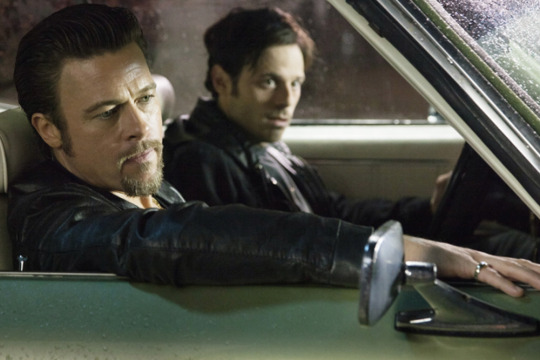
“Shitsville.” That’s the name Killing Them Softly director Andrew Dominik gave to the film’s nameless town, in which low-level criminals, ambitious mid-tier gangsters, nihilistic assassins, and the mob’s professional managerial class engage in warfare of the most savage kind. Onscreen, other states are mentioned (New York, Maryland, Florida), and the film itself was filmed in post-Hurricane Katrina New Orleans, though some of the characters speak with Boston accents that are pulled from the source material, George V. Higgins’s novel Cogan’s Trade. But Dominik, by shifting Higgins’s narrative 30 or so years into the future and situating it specifically during the 2008 Presidential election, refuses to limit this story to one place. His frustrations with America as an institution that works for some and not all are broad and borderless, and so Shitsville serves as a stand-in for all the places not pretty enough for gentrifying developers to turn into income-generating properties, for all the cities whose industrial booms are decades in the past, and for all the communities forgotten by the idea of progress._ Killing Them Softly_ is a movie about the American dream as an unbeatable addiction, the kind of thing that invigorates and poisons you both, and that story isn’t just about one place. That’s everywhere in America, and nearly a decade after the release of Dominik’s film, that bitter bleakness still has grim resonance.
In November 2012, though, when Killing Them Softly was originally released, Dominik’s gangster picture-cum-pointed criticism of then-President Barack Obama’s vision of an America united in the same neoliberal goals received reviews that were decidedly mixed, tipping toward negative. (Audiences, meanwhile, stayed away, with Killing Them Softly opening at No. 7 with $7 million, one of the worst box office weekends of Brad Pitt’s entire career at that time.) Obama’s first term had been won on a tide of hope, optimism, and “better angels of our nature” solidarity, and he had just defeated Mitt Romney for another four years in the White House when Killing Them Softly hit theaters on Nov. 30. Cogan’s Trade had no political components, and no connections between the thieving and killing promulgated by these criminals and the country at large. Killing Them Softly, meanwhile, took every opportunity it could to chip away at the idea that a better life awaits us all if we just buy into the idea of American exceptionalism and pull-yourself-up-by-your-bootstraps ingenuity. A fair amount of reviews didn’t hold back their loathing toward this approach. A.O. Scott with the New York Times dismissed Dominik’s frame as “a clumsy device, a feint toward significance that nothing else in the movie earns … the movie is more concerned with conjuring an aura of meaningfulness than with actually meaning anything.” Many critics lambasted Dominik’s nihilism: For Deadspin, Will Leitch called it a “crutch, and an awfully flimsy one,” while Richard Roeper thought the film collapsed under the “crushing weight” of Dominik’s philosophy. It was the beginning of Obama’s second term, and people still thought things might get better.
But Dominik’s film—like another that came out a few years earlier, Adam McKay’s 2010 political comedy The Other Guys—has maintained a crystalline kind of ideological purity, and perhaps gained a certain prescience. Its idea that America is less a bastion of betterment than a collection of corporate interests, and the simmering anger Brad Pitt’s Jackie Cogan captures in the film’s final moments, are increasingly difficult to brush off given the past decade or so in American life. This is not to say that Obama’s second term was a failure, but that it was defined over and over again by the limitations of top-down reform. Ceaseless Republican obstruction, widespread economic instability, and unapologetic police brutality marred the encouraging tenor of Obama’s presidency. Donald Trump’s subsequent four years in office were spent stacking the federal judiciary with young, conservative judges sympathetic toward his pro-big-business, fuck-the-little-guy approach, and his primary legislative triumph was a tax bill that will steadily hurt working-class people year after year.
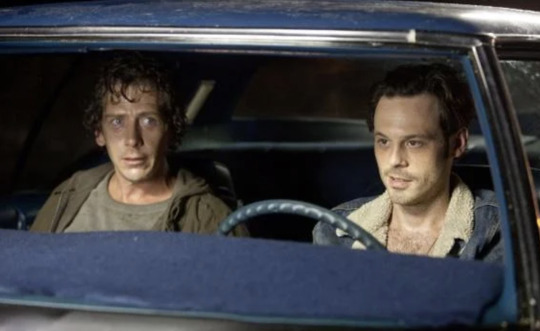
The election of Obama’s vice president Joe Biden, and the Democratic Party securing control of the U.S. Senate, were enough for a brief sigh of relief in November 2020. The $1.9 trillion stimulus bill passed in March 2021 does a lot of good in extending (albeit lessened) unemployment benefits, providing a child credit to qualifying families, and funneling further COVID-19 support to school districts after a year of the coronavirus pandemic. But Republicans? They all voted no to helping the Americans they represent. Stimulus checks to the middle-class voters who voted Biden into office? Decreased for some, totally cut off for others, because of Biden’s appeasement to the centrists in his party. $15 minimum wage? Struck down, by both Republicans and Democrats. In how many more ways can those politicians who are meant to serve us indicate that they have little interest in doing anything of the kind?
Modern American politics, then, can be seen as quite a performative endeavor, and an exercise in passing blame. Who caused the economic collapse of 2008? Some bad actors, who the government bailed out. Who suffered the most as a result? Everyday Americans, many of whom have never recovered. Killing Them Softly mimics this dynamic, and emphasizes the gulf between the oppressors and the oppressed. The nameless elites of the mob, sending a middle manager to oversee their dirty work. The poker-game organizer, who must be brutally punished for a mistake made years before. The felons let down by the criminal justice system, who turn again to crime for a lack of other options. The hitman who brushes off all questions of morality, and whose primary concern is getting adequately paid for his work. Money, money, money. “This country is fucked, I’m telling ya. There’s a plague coming,” Jackie Cogan says to the Driver who delivers the mob’s by-committee rulings as to who Jackie should intimidate, threaten, and kill so their coffers can start getting filled again. Perhaps the plague is already here.
“Total fucking economic collapse.”
In terms of pure gumption, you have to applaud Dominik for taking aim at some of the biggest myths America likes to tell about itself. After analyzing the dueling natures of fame and infamy through the lens of American outlaw mystique in The Assassination of Jesse James by the Coward Robert Ford, Dominik thought bigger, taking on the entire American dream itself in Killing Them Softly. From the film’s very first second, Dominik doesn’t hold back, equating an easy path of forward progress with literal trash. Discordant tones and the film’s stark, white-on-black title cards interrupt Presidential hopeful Barack Obama’s speech about “the American promise,” slicing apart Obama’s words and his crowd’s responding cheers as felon Frankie (Scoot McNairy), in the all-American outfit of a denim jacket and jeans, cuts through what looks like a shut-down factory, debris and garbage blowing around him. Obama’s assurances sound very encouraging indeed: “Each of us has the freedom to make of our own lives what we will.” But when Frankie—surrounded by trash, cigarette dangling from his mouth, and eyes squinting shut against the wind—walks under dueling billboards of Obama, with the word “CHANGE” in all-caps, and Republican opponent John McCain, paired with the phrase “KEEPING AMERICA STRONG,” a better future doesn’t exactly seem possible. Frankie looks too downtrodden, too weary of all the emptiness around him, for that.
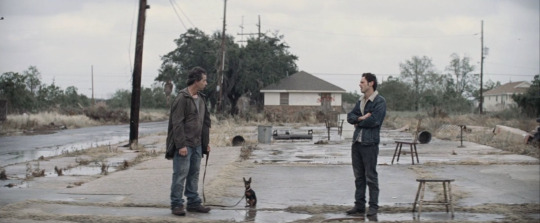
Dominik and cinematographer Greig Fraser spoke to American Cinematographer magazine in October 2012 about shooting in post-Hurricane Katrina New Orleans: “We were aiming for something generic, a little town between New Orleans, Boston and D.C. that we called Shitsville. We wanted the place to look like it’s on the down-and-down, on the way out. We wanted viewers to feel just how smelly and grimy and horrible it was, but at the same time, we didn’t want to alienate them visually.” They were successful: Every location has a rundown quality, from the empty lot in which Frankie waits for friend and partner-in-crime Russell (Ben Mendelsohn)—a concrete expanse decorated with a couple of wooden chairs, as if people with nowhere else to go use this as a gathering spot—to the dingy laundromat backroom where Frankie and Russell meet with criminal mastermind Johnny “Squirrel” Amato (Vincent Curatola), who enlists them to rob a mafia game night run by Markie Trattman (Ray Liotta), to the restaurant kitchen where the game is run, all sickly fluorescent lights, cracked tile, and makeshift tables. Holding up a game like this, from which the cash left on the tables flows upward into the mob’s pockets, is dangerous indeed. But years before, Markie himself engineered a robbery of the game, and although that transgression was forgiven because of how well-liked Markie is in this institution, it would be easy to lay the blame on him again. And that’s exactly what Squirrel, Frankie, and Russell plan to do.
The “Why?” for such a risk isn’t that hard to figure out. Squirrel sees an opportunity to make off with other people’s money, he knows that any accusatory fingers will point elsewhere first, and he wants to act on it before some other aspiring baddie does. (Ahem, sound like the 2008 mortgage crisis to you?) Frankie, tired of the crappy jobs his probation officer keeps suggesting—jobs that require both long hours and a long commute, when Frankie can’t even afford a car (“Why the fuck do they think I need a job in the first place? Fucking assholes”)—is drawn in by desperation borne from a lack of options. If he doesn’t come into some kind of money soon, “I’m gonna have to go back and knock on the gate and say, ‘Let me back in, I can’t think of nothing and it’s starting to get cold,’” Frankie admits. And Australian immigrant and heroin addict Russell is nursing his own version of the American dream: He’s going to steal a bunch of purebred dogs, drive them down to Florida to sell for thousands of dollars, buy an ounce of heroin once he has $7,000 in hand, and then step on the heroin enough to become a dealer. It’s only a few moves from where he is to where he wants to be, he figures, and this card-game heist can help him get there.
In softly lit rooms, where the men in the frame are in focus and their surroundings and backgrounds are slightly blown out, slightly blurred, or slightly fuzzy (“Creaminess is something you feel you can enter into, like a bath; you want to be absorbed and encompassed by it” Fraser told American Cinematographer of his approach), garish deals are made, and then somehow pulled off with a sobering combination of ineptitude and ugliness. Russell buys yellow dishwashing gloves for himself and Frankie to wear during the holdup, and they look absurd—but the pistol-whipping Russell doles out to Markie still hurts like hell, no matter what accessories he’s wearing. Dominik gives this holdup the paranoia and claustrophobia it requires, revolving his camera around the barely-holding-it-together Frankie and cutting every so often to the enraged players, their eyes glancing up to look at Frankie’s face, their hands twitching toward their guns. But in the end, nobody moves. When Frankie and Russell add insult to injury by picking the players’ pockets (“It’s only money,” they say, as if this entire ordeal isn’t exclusively about wanting other people’s money), nobody fights back. Nobody dies. Frankie and Russell make off with thousands of dollars in two suitcases, while Markie is left bamboozled—and afraid—by what just happened. And the players? They’ll get their revenge eventually. You can count on that.
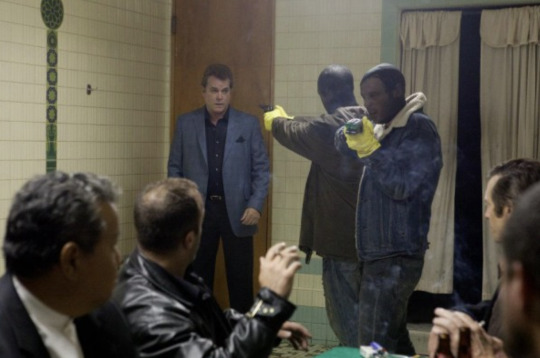
So it goes that Dominik smash cuts us from the elated and triumphant Russell and Frankie driving away from the heist in their stolen 1971 Buick Riviera, its headlights interrupting the inky-black night, to the inside of Jackie Cogan’s 1967 Oldsmobile Toronado, with Johnny Cash’s “The Man Comes Around” providing an evocative accompaniment. “There’s a man going around taking names/And he decides who to free, and who to blame/Everybody won’t be treated all the same,” Cash sings in that unmistakably gravelly voice, and that’s exactly what Jackie does. Called in by the mob to capture who robbed the game so that gambling can begin again, Jackie meets with an unnamed character, referred to only as the Driver (Richard Jenkins), who serves as the mob’s representative in these sorts of matters. Unlike the other criminals in this film—Frankie, with his tousled hair and sheepish face; Russell, with his constant sweatiness and dog-funk smell; Jackie, in his tailored three-piece suits and slicked-back hair; Markie, with those uncannily blue eyes and his matching slate sportscoat—the Driver looks like a square.
He is, like the men who replace Mike Milligan in the second season of Fargo, a kind of accountant, a man with an office and a secretary. “The past can no more become the future than the future can become the past,” Milligan had said, and for all the backward-looking details of Killing Them Softly—American cars from the 1960s and 1970s, that whole masculine code-of-honor thing that Frankie and Russell break by ripping off Markie’s game, the post-industrial economic slump that brings to mind the American recession of 1973 to 1975—the Driver is very much an arm of a new kind of organized crime. He keeps his hands clean, and he delivers what the ruling-by-committee organized criminals decide, and he’s fussy about Jackie smoking cigarettes in his car, and he’s so bland as to be utterly forgettable. And he has the power, as authorized by his higher-ups, to approve Jackie putting pressure on Markie for more information about the robbery. It doesn’t matter that neither Jackie nor the mob thinks Markie actually did it. What matters more is that “People are losing money. They don’t like to lose money,” and so Jackie can do whatever he needs. Dominik gives him this primacy through a beautiful shot of Jackie’s reflection in the car window, his aviators a glinting interruption to the gray concrete overpass under which the Driver’s car is parked, to the smoke billowing out from faraway stacks, and to the overall gloominess of the day.
“We regret having to take these actions. Today’s actions are not what we ever wanted to do, but today’s actions are what we must do to restore confidence to our financial system,” we hear Treasury Secretary Henry Paulson say on the radio in the Driver’s car, and his October 14, 2008, remarks are about the Emergency Economic Stabilization Act of 2008—the government bailout of banks and other financial institutions that cost taxpayers $700 billion. (Remember Will Ferrell’s deadpan delivery in The Other Guys of “From everything I’ve heard, you guys [at the Securities and Exchange Commission] are the best at these types of investigations. Outside of Enron and AIG, and Bernie Madoff, WorldCom, Bear Stearns, Lehman Brothers ...”) Yet the appeasing sentiment of Paulson’s words applies to Jackie, too, and to the beating he orders for Markie—a man he suspects did nothing wrong, at least not this time. But debts must be settled. Heads must roll. “Whoever is unjust, let him be unjust still/Whoever is righteous, let him be righteous still/Whoever is filthy, let him be filthy still,” Cash sang, and Jackie is all those men, and he’ll collect the stolen golden crowns as best he can. For a price, of course. Always for a price.
“I like to kill them softly, from a distance, not close enough for feelings. Don’t like feelings. Don’t want to think about them.”
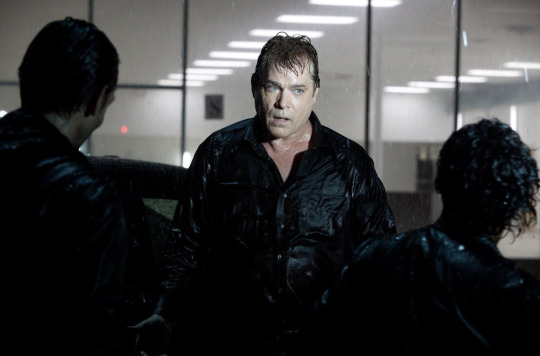
In “Bad Dreams,” the penultimate episode of the second season of The Wire, International Brotherhood of Stevedores union representative Frank Sobotka (Chris Bauer), having seen his brothers in arms made immaterial by the lack of work at the Baltimore ports and the collapse of their industry, learns that his years of bribing politicians to vote for expanded funding for the longshoremen isn’t going to pay off. He is furious, and he is exhausted. “We used to make shit in this country, build shit. Now we just put our hand in the next guy’s pocket,” he says with the fatigue of a man who knows his time has run out, and you can draw a direct line from Bauer’s beleaguered delivery of those lines to Liotta’s aghast reaction to the horrendous beating he receives from Jackie’s henchmen. Sobotka in The Wire had no idea how he got to that helpless place, and neither does Markie in Killing Them Softly—he made a mistake, but that was years ago. Everyone forgave him. Didn’t they?
The vicious assault leveled upon Markie is a harrowing, horrifying sequence that is also unnervingly beautiful, and made all the more awful as a result of that visual splendor. In the pouring rain, Markie is held captive by the two men, who deliver bruising body shots, break his noise, batter his body against the car, and kick in his ribs. “You see fight scenes a lot in movies, but you don’t see people systematically beating somebody else. The idea was just to make it really, really, really ugly,” Dominik told the New York Times in November 2012, and sound mixer Leslie Shatz and cinematographer Fraser also contributed to this unforgettable scene. Shatz used the sound of a squeegee across a windshield to accentuate Markie’s increasingly destroyed body slumping against the car, and also incorporated flash bulbs going off as punches were thrown, adding a kind of lingering effect to the scene’s soundscape. And although the scene looks like it’s shot in slow motion, Fraser explained to American Cinematographer that the combination of an overhead softbox and dozens of background lights helped build that layered effect in which Liotta is fully illuminated while the dark night around him remains impenetrable. Every drop of rain and every splatter of blood stands out on Markie’s face as he confesses ignorance regarding the robbery and begs for mercy from Jackie’s men, but Markie has already been marked for death. When the time comes, Jackie will shoot him in the head in another exquisitely detailed, shot-in-ultrahigh-speed scene that bounces back and forth between the initial act of violence and its ensuing destruction. The cartridges flying out of Jackie’s gun, and the bullets destroying Markie’s window, and then his brain. Markie’s car, now no longer in his control, rolling forward into an intersection where it’s hit not just once, but twice, by oncoming cars. The crunching sound of Markie’s head against his windshield, and the vision of that glass splintering from the impact of his flung body, are impossible to shake.
“Cause and effect,” Dominik seems to be telling us, and Killing Them Softly follows Jackie as he cleans up the mess Squirrel, Frankie, and Russell have made. After he enlists another hitman, Mickey (a fantastically whoozy James Gandolfini, who carries his bulk like the armor of a samurai searching for a new master), whose constant boozing, whoring, and laziness shock Jackie after years of successful work together, and who refuses to do the killing for which Jackie secured him a $15,000 payday, Jackie realizes he’ll need to do this all himself. He’ll need to gather the intel that fingers Frankie, Russell, and Squirrel. He’ll need to set up a police sting to entrap Russell on his purchased ounce of heroin, violating the terms of his probation, and he’ll need to set up another police sting to entrap Mickey for getting in a fight with a prostitute, violating the terms of his probation. For Jackie, a career criminal for whom ethical questions have long since evaporated, Russell’s and Frankie’s sloppiness in terms of bragging about their score is a source of disgust. “I guess these guys, they just want to go to jail. They probably feel at home there,” he muses, and he’s then exasperated by the Driver’s trepidation regarding the brutality of his methods. Did the Driver’s bosses want the job done or not? “We aim to please,” Jackie smirks, and that shark smile is the sign of a predator getting ready to feast.
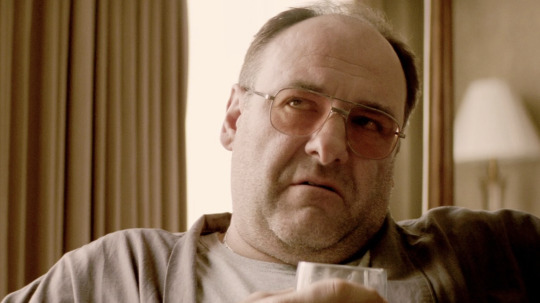
Things progress rapidly then: Jackie tracks Frankie down to the bar where he hangs out, and sneers at Frankie’s reticence to turn on Squirrel. “They’re real nice guys,” he says mockingly to Frankie of the criminal underworld of which they’re a part, brushing off Frankie’s defense that Squirrel “didn’t mean it.” “That’s got nothing to do with it. Nothing at all,” Jackie replies, and that’s the kind of distance that keeps Jackie in this job. Sure, the vast majority of us aren’t murderers. But as a question of scale, aren’t all of us as workers compromised in some way? Employees of companies, institutions, or billionaires that, say, pollute the environment, or underpay their staff, or shirk labor laws, or rake in unheard-of profits during an international pandemic? Or a government that spreads imperialism through allegedly righteous military action (referenced in Killing Them Softly, as news coverage of the economic crisis mentions the reckless rapidity with which President George W. Bush invaded Afghanistan and Iraq after Sept. 11, 2001), or that can’t quite figure out how to house the nation’s homeless into the millions of vacant homes sitting empty around the country, or that refuses, over and over again, to raise the minimum wage workers are paid so that they have enough financial security to live decent lives?
Perhaps you bristle at this comparison to Jackie Cogan, a man who has no qualms blowing apart Squirrel with a shotgun at close range, or unloading a revolver into Frankie after spending an evening driving around with him. But the guiding American principle when it comes to work is that you do a job and you get paid: It’s a very simple contract, and both sides need to operate in good faith to fulfill it. Salaried employees, hourly workers, freelancers, contractors, day laborers, the underemployed—all operate under the assumption that they’ll be compensated, and all live with the fear that they won’t. Jackie knows this, as evidenced by his loathing toward compatriot Kenny (Slaine) when the man tries to pocket the tip Jackie left for his diner waitress. “For fuck’s sake,” Jackie says in response to Kenny’s attempted theft, and you can sense that if Jackie could kill him in that moment, he would. In this way, Jackie is rigidly conservative, and strictly old-school. Someone else’s money isn’t yours to take; it’s your responsibility to earn, and your employer’s responsibility to pay. Jackie cleaned up the mob’s mess, and the gambling tables opened again because of his work, and his labor resulted in their continued profits. And Jackie wants what he’s owed.
“Don’t make me laugh. ‘We’re one people.’”
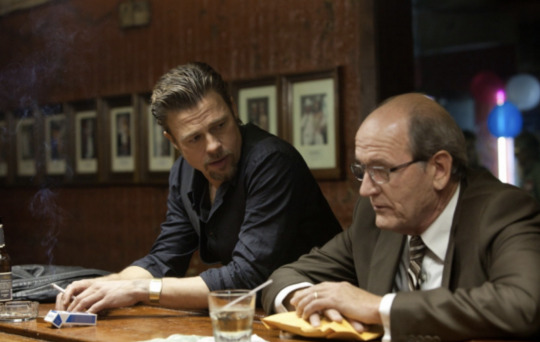
We hear two main voices of authority urging calm throughout Killing Them Softly. Then-President Bush: “I understand your worries and your frustration. … We’re in the midst of a serious financial crisis, and the federal government is responding with decisive action.” Presidential hopeful Obama: “There’s only the road we’re traveling on as Americans.” Paulson speaks on the Emergency Economic Stabilization Act, and various news commentators chime in, too: “There needs to be consequences, and there needs to be major change.” Radio commentary and C-SPAN coverage combine into a sort of secondary accompaniment to Marc Streitenfeld’s score, which incorporates lyrically germane Big Band standards like “Life Is Just a Bowl of Cherries” (“You work, you save, you worry so/But you can’t take your dough”) and “It’s Only a Paper Moon” (“It's a Barnum and Bailey world/Just as phony as it can be”). All of these are Dominik’s additions to Cogan’s Trade, which is a slim, 19-chapter book without any political angle, and this frame is what met so much resistance from contemporaneous reviews.
But what Dominik accomplishes with this approach is twofold. First, a reminder of the ceaseless tension and all-encompassing anxiety of that time, which would spill into the Occupy Wall Street movement, coalesce support around politicians like Bernie Sanders and Elizabeth Warren, and fuel growing national interest in policies like universal health care and universal basic income. For anyone who struggled during that time—as I did, a college graduate entering the 2009 job market after the journalism industry was already beginning its still-continuing freefall—Killing Them Softly captures the free-floating anger so many of us felt at politicians bailing out corporations rather than people. Perhaps in 2012, only weeks after the re-election of Obama and with the potential that his second term could deliver on some of his campaign promises (closing Guantanamo Bay, maybe, or passing significant gun control reform, maybe), this cinematic scolding felt like medicine. But nearly a decade later, with neither of these legislative successes in hand, and with the wins for America’s workers so few and far between—still a $7.25 federal minimum wage, still no federal paid maternity and family leave act, still the refusal by many states to let their government employees unionize—if you don’t feel demoralized by how often the successes of the Democratic Party are stifled by the party’s own moderates or thoroughly curtailed by saboteur Republicans, maybe you’re not paying attention.
More acutely, then, the mutinous spirit of Killing Them Softly accomplishes something similar to what 1990’s Pump Up the Volume did: It allows one to say, with no irony whatsoever, “Do you ever get the feeling everything in America is completely fucked up?” The disparities of the financial system, and the yawning gap between the rich and the poor. The utter lack of accountability toward those who were supposed to protect us, and didn’t. And the sense that we’re always being a little bit cheated by a ruling class who, like Sobotka observed on The Wire, is always putting their hand in our pocket. Consider Killing Them Softly’s quietest moment, in which Frankie realizes that he’s a hunted man, and that the people from whom he stole would never let him live. Dominik frames McNairy tight, his expression a flickering mixture of plaintive yearning and melancholic regret, as he quietly says, “It’s just shit, you know? The world is just shit. We’re all just on our own.” A day or so later, McNairy’s Frankie will be lying on a medical examiner’s table, his head partially collapsed from a bullet to the brain, an identification tag looped around his pinky toe. And the men who ordered his death want to underpay the man who carried it out for them. Isn’t that the shit?
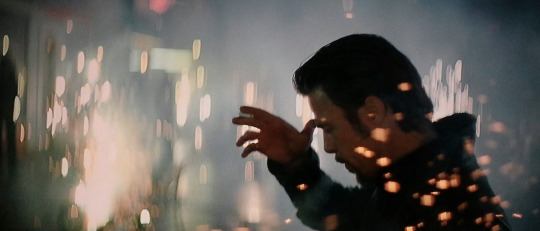
That leads us, then, to the film’s angriest moment, and to a scene that stands alongside the climaxes of so many other post-recession films: Chris Pine’s Toby Howard paying off the predatory bank that swindled his mother with its own stolen money in Hell or High Water, Lakeith Stanfield’s Cash Green and his fellow Equisapiens storming billionaire Steve Lift’s (Armie Hammer’s) mansion in Sorry to Bother You, Viola Davis’s Veronica Rawlings shooting her cheating husband and keeping the heist take for herself and her female comrades in Widows. So far in Killing Them Softly, Pitt has played Jackie with a certain level of remove. A man’s got to have a code, and his is fairly simple: Don’t get involved emotionally with the assignment. Pitt’s Jackie is susceptible to flashes of irritation, though, that manifest as a smile that doesn’t reach his eyes, and as an octave-lower growl that belies his impatience: with the Driver, for not understanding how Markie’s reputation has doomed him; with Mickey, for his procrastination and his slovenliness; with Kenny, for stealing a hardworking woman’s tip; with Frankie, when he tries to distract Jackie from killing Squirrel. Jackie is a professional, and he is intolerant of people failing to work at his level, and Pitt plays the man as tiptoeing along a knife’s edge. Remember Daniel Craig’s “’Cause it’s all so fucking hysterical” line delivery in Road to Perdition? Pitt’s whole performance is that: a hybrid offering of bemusement, smugness, and ferocity that suggests a man who’s seen it all, and hasn’t been impressed by much.
In the final minutes of Killing Them Softly, Obama has won his historic first term in the White House, and Pitt’s Jackie strides through a red haze of celebratory fireworks as he walks to meet the Driver at a bar to retrieve payment. An American flag hangs in this dive, and the TV broadcasts Obama’s victory speech, delivered in Chicago to a crowd of more than 240,000. “Crime stories, to some extent, always felt like the capitalist ideal in motion,” Dominik told the New York Times. “Because it’s the one genre where it’s perfectly acceptable for the characters to be motivated solely by money.” And so it goes that Jackie feels no guilt for the men he’s killed, or the men he’s sent away. Nor does he feel any empathy or kinship with the newly elected Obama, whose messages of unity and community he finds amusingly irrelevant. The life Jackie lives is one defined by how little people value each other, and how quick they are to attack one another if that means more opportunity—and more money—for them. Thomas Hobbes said that a life without social structure and political representation would be “solitary, poor, nasty, brutish, and short,” and perhaps that’s exactly what Jackie’s is. Unlike the character in Cogan’s Trade, Dominik’s Jackie has no wife and no personal life. But he’s surviving this way with his eyes wide open, and he will not be undervalued.
The contrast between Obama’s speech about “the enduring power of our ideas—democracy, liberty, opportunity, and unyielding hope”—and Jackie’s realization that the mob is trying to underpay him for the three men he assassinated at their behest makes for a kind of nauseating, thrilling coda. He’s owed $45,000, and the envelope the Driver paid him only has $30,000 in it. Obama’s audience chanting “Yes, we can,” the English translation of the United Farm Workers of America’s slogan and the activist César Chávez’s iconic “Sí, se puede” catchphrase, adds an ironic edge to the argument between the Driver and Jackie about the value of his labor. Whatever the Driver can use to try and shrug off Jackie’s advocacy for himself, he will. Jackie’s killings were too messy. Jackie is asking for more than the mob’s usual enforcer, Dillon (Sam Shepard), who would have done a better job. Jackie is ignoring that the mob is limited to “Recession prices”—they’re suffering, so that suffering has to trickle down to someone. Jackie made the deal with Mickey for $15,000 per head, and the mob isn’t beholden to pay Jackie what they agreed to pay Mickey.
On and on, excuse after excuse, until one finally pushes Jackie over the edge: “This business is a business of relationships,” the Driver says, which is one step away from the “We’re all family here” line that so many abusive companies use to manipulate their cowed employees. And so when Jackie goes coolly feral in his response, dropping knowledge not only about the artifice of the racist Thomas Jefferson as a Founding Father but underscoring the idea that America has always been, and will always be, a capitalist enterprise first, the moment slaps all the harder for all the ways we know we’ve been let down by feckless bureaucrats like the Driver, who do only as they’re told; by faceless corporate overlords like the mob, issuing orders to Jackie from on high; and by a broader country that seems like it couldn’t care less about us. “I’m living in America, and in America, you’re on your own … Now fucking pay me” serves as a kind of clarion call, an expression of vehemence and resentment, and a direct line into the kind of anger that still festers among those continuously left behind—still living in Shitstown, still trying to make a better life for themselves, and still asking for a little more respect from their fellow Americans. For all of Killing Them Softly’s ugliness, for all its nihilism, and for all its commentary on how our country’s ruthless individualism has turned chasing the American dream into a crippling addiction we all share, that demand for dignity remains distressingly relevant. Maybe it’s time to listen.
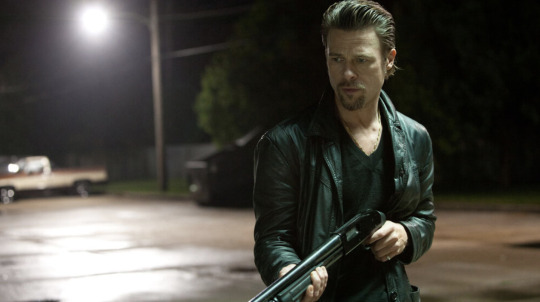
#killing them softly#andrew dominik#andrew dominik film#brad pitt#Jackie Cogan#james gandolfini#richard jenkins#ray liotta#scoot mcnairy#ben mendelsohn#american cinematographer#financial crisis 2008#independent film#beastie boys#oscilloscope laboratories#film writing#musings
31 notes
·
View notes
Text
Star Trek: Facets of Filmmaking
As it turns out, before Star Trek was fully realized in the form we know today, the show was originally not going to be about Kirk and the Enterprise at all. In fact, it was going to be about a ship called the S.S. Yorktown, captained by a man named Robert April, on a mission to explore the Milky Way galaxy. The original concept, still named Star Trek and set in the 23rd century, was loosely based on the Horatio Hornblower novels, and took inspiration from The Voyage of the Space Beagle, the Marathon series and the 1956 film Forbidden Planet.
By the year 1964, when this idea began to take shape, Gene Roddenberry, creator of Star Trek was an experienced writer for western television shows, and was well accustomed to (at the time) television’s favorite and most popular genre. By 1964, however, Roddenberry was tired of the shootouts, and wanted to do something different, something with a little more depth to it.
Still, Roddenberry knew what the executives, and the public, was used to. As a result, the first draft of this new Star Trek idea was generalized as a sort of ‘Wagon Train to the Stars’, a formulaic type of show where every episode was a standalone adventure in the continuous exploration of the final frontier: space.
As Roddenberry wrote the draft, a few things changed. Gone was Robert April, replaced by Captain Christopher Pike, who would be portrayed by Jefferey Hunter, and the rest of the crew. The name of the ship changed too, to the more familiar Enterprise. As these changes came about, so too did the true nature of Roddenberry’s dream show: both an adventure story, and a thought-provoking morality tale.
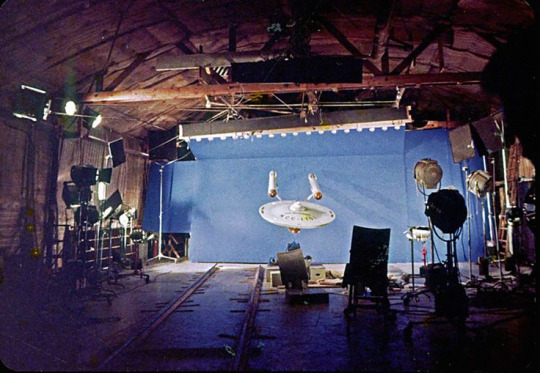
Armed with his script, Roddenberry brought Star Trek to Desilu Productions, (a rather large television production company headed and half-formed by Lucille Ball herself) and met with director of production Herbert F. Solow. Solow saw promise in the concept, and signed a three-year development contract with Roddenberry.
Star Trek moved into the next stage of development. Further drafts were drawn up and the idea that would later become the episode The Cage was revised, until it was shown to CBS as part of the ‘First Look’ deal with Desilu productions. CBS wasn’t impressed with the show, declining to purchase it. They had another ‘space show’ in development that seemed too similar, a show that would become Lost in Space.
However, another company became interested: NBC. In May of 1964, Grant Tinker, the head of the West Coast programming department, commissioned the pilot that would become The Cage (which would later be reworked into the episode The Menagerie). After it was completed, NBC turned it down, claiming that it was ‘too cerebral’, but although this was a mild defeat, Star Trek wasn’t beaten. NBC still showed interest in the concept, and made the highly unusual decision to commission a second pilot: the episode that would become Where No Man Has Gone Before.
With this came quite a few changes.
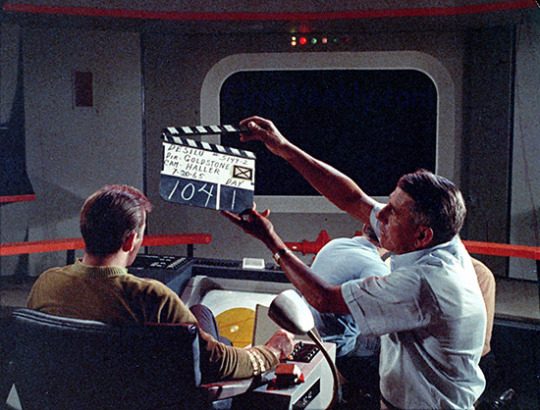
Christopher Pike was scrapped as a character, as was the vast majority of other cast members. Only the character of Spock, as portrayed by Leonard Nimoy, was kept, and of the other cast members, only Majel Barrett stayed, demoted from playing the second-in-command (scrapped due to the unthinkable notion of a woman Commander) to the ship’s nurse, Christine Chapel. With this new pilot came an onslaught of new, more familiar names and faces: William Shatner as Captain Kirk, Chief Engineer Lieutenant Commander Scott played by James Doohan, and Lieutenant Sulu, (originally a physicist in the first episode, but a helmsman afterwards) played by George Takei.
This pilot passed with flying colors, and with that, NBC added Star Trek to their fall lineup for 1966.
Still, there were changes to be made. In this first pilot, the ship’s doctor was Mark Piper, played by Paul Fix. Dr. Leonard McCoy, played by DeForest Kelley, would join the cast when principal filming for the first season began. Also joining the cast was Nichelle Nichols, playing Lieutenant Uhura, and Grace Lee Whitney as Yeoman Rand. (Whitney would depart halfway through the first season, after being on the receiving end of sexual assault from one of the executives of the show, but would later appear in the film series beginning in the 1970s.)
Besides Where No Man Has Gone Before, NBC ordered 15 episodes to start off the show. The first episode of Star Trek, The Man Trap, aired at 8:30 PM on Thursday, September 8th of 1966 as part of NBC’s ‘sneak preview’ time slot, received with mixed feelings. While some papers and reviewers genuinely liked the new show, (such as The Philadelphia Inquirer and the San Francisco Chronicle) others, such as The Boston Globe and The New York Times didn’t. Variety described the show as ‘an incredible and dreary mess of confusion and complexities’, and predicted that it would fail.
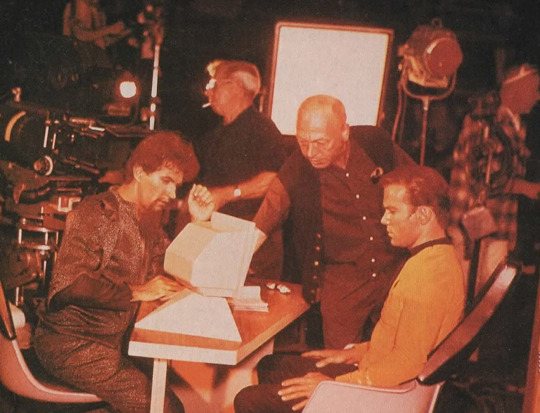
Fighting for position against reruns of previous shows, despite the critics’ warnings, Star Trek won a time slot, and began with decent ratings. However, it didn’t last long. By the end of the first season, Star Trek was sitting at 52nd out of 94 programs.
Star Trek was sinking, fast.
But even then, it wasn’t without its supporters.
The editor of Galaxy Science Fiction, Frederik Pohl, offered up his amazement that Star Trek’s consistency remained good, with no drop in quality after its Tricon winning early episodes. He expressed his fear that the show would be cancelled due to its low ratings, and pleaded with audiences to help save Star Trek, writing letters to prevent its cancellation.
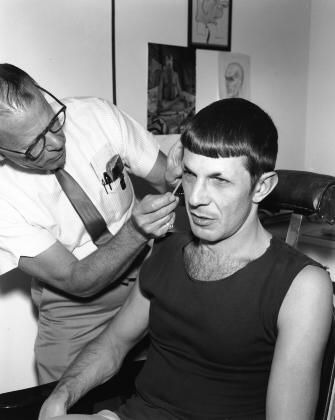
At this time, the only thing that was keeping the show on the air in the first place was the demographics it was reaching. NBC had become interested in the demographics of the shows it was producing in the early 1960s, and by 1967, was using that as part of the decision making as to which shows got dropped.
And something about Star Trek’s demographics interested NBC very much: it had managed to attract ‘quality’ audiences: high income, high educated people (primarily males).
As a result, NBC ordered ten more episodes for the first season, and ordered a second in March of 1967. The network then changed Star Trek’s timeslot, moving it to 8:30 on Friday nights, a timeslot that seemed doomed for failure among the audience that Star Trek had gathered.
The next season, things didn’t seem to be getting any better. It was at this point that the show added on Walter Koenig as Ensign Chekov (as George Takei was working on The Green Berets and was not as available for shooting), although some might have wondered why they would have bothered. The show’s ratings were still dropping. William Shatner, expecting the show to be cancelled, began to prepare for other projects.
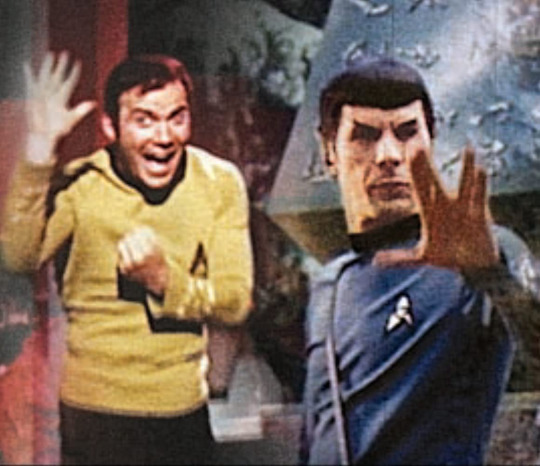
Again, the demographics saved the day.
Roddenberry’s initial concept of adventure alongside morality tales intrigued the audiences Star Trek had attracted. The show had values, values that had to be applied to every situation. The show was sincere, and serious in its exploration of issues like racism, war and peace, human rights, technology, class warfare, and imperialism, far different in tone and content than the other chief sci-fi show at the time: Lost in Space. As a result, the show generated a more interested fanbase, perhaps the first true ‘fanbase’ of any franchise in history. In the end, it was they who saved Star Trek.
By the end of the first season, NBC had received well over 29,000 fan letters. During the second season, Roddenberry began a campaign to persuade fans to write in to NBC, to support the show and save the program. Between December of 1967 and March of 1968, NCB had received nearly 116,000 letters from people who did not want to see Star Trek cancelled. Science fiction conventions, magazines, and newspaper columnists encouraged readers to save what was called ‘the best science-fiction show on the air’.
The fans didn’t stop with letters. Over 200 students of the California Institute of Technology marched to NBC’s studio in Burbank to protest the cancellation of Star Trek in January of 1968, carrying signs that said things like ‘Vulcan Power’. They weren’t alone; other groups of students of MIT and Berkeley did the same thing in New York City and San Francisco.
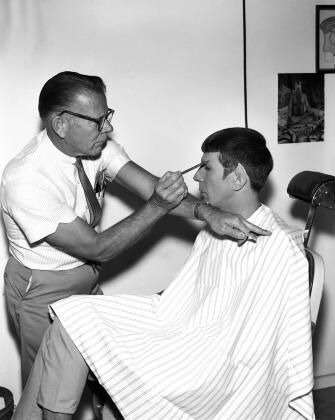
Interestingly, the letters that NBC received were not of the typical ‘fan mail’ quality.
“Much of the mail came from doctors, scientists, teachers, and other professional people, and was for the most part literate–and written on good stationery. And if there is anything a network wants almost as much as a high Nielsen ratings, it is the prestige of a show that appeals to the upper middle class and high-brow audiences.” (Lowry, Cynthia (January 17, 1968). “One Network Goes ‘Unconventional’”. Nashua Telegraph. Associated Press. p. 13)
“The show, according to the 6,000 letters it draws a week (more than any other in television), is watched by scientists, museum curators, psychiatrists, doctors, university professors, and other highbrows. The Smithsonian Institution asked for a print of the show for its archives, the only show so honored.” (Scott, Vernon (February 7, 1968). “Letters Can Save 'Star Trek’”. The Press-Courier. Oxnard, California. United Press International. p. 17.)
After the episode The Omega Glory, on March 1st, 1968, the announcement came:
“And now an announcement of interest to all viewers of Star Trek. We are pleased to tell you that Star Trek will continue to be seen on NBC Television. We know you will be looking forward to seeing the weekly adventure in space on Star Trek.” (“Letters For 'Star Trek’ Hit 114,667”. The Modesto Bee. April 14, 1968. p. 26.)
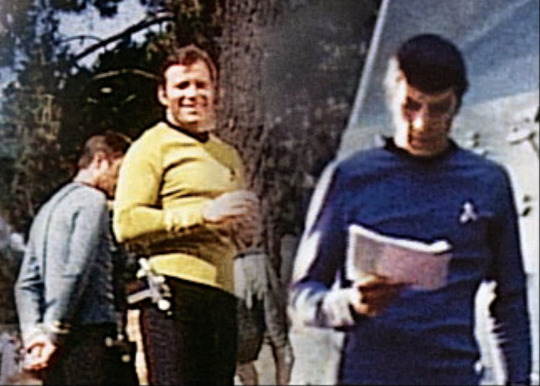
If this was intended to stop the letter writing campaign, it was a dismal failure. A comparable number of letters came in to NBC following this announcement, full of thanks for renewing the show for the third season.
In March of 1968, NBC moved Star Trek to another time slot: 10:00 PM on Fridays, an even worse shot than before. To make matters worse, it was only being seen by 181 out of 210 of NBC’s affiliates. Roddenberry fought the network to move it to a better time, but he was denied. Exhausted, Roddenberry quit working on production of Star Trek, remaining executive producer in name only. The running of the show went to Fred Freiberger, who was with the show as it stood on its last, shaky, legs.
And it was on its last legs.
Star Trek season three was a dying breath, the death-rattle of a show that was being intentionally destroyed by its own network.
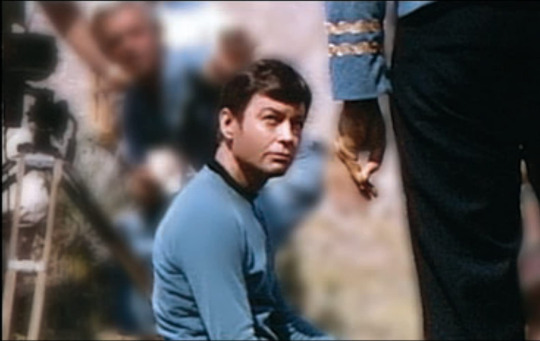
To quote Nichelle Nichols:
“While NBC paid lip service to expanding Star Trek’s audience, it [now] slashed our production budget until it was actually 10% lower than it had been in our first season … This is why in the third season you saw fewer outdoor location shots, for example. Top writers, top guest stars, top anything you needed was harder to come by. Thus, Star Trek’s demise became a self-fulfilling prophecy. And I can assure you, that is exactly as it was meant to be.”
It showed.
While I hesitate to call season three of Star Trek a mess, it is difficult to deny that the show was definitely struggling. Episodes dropped in quality, characters became more exaggerated and less ‘true’. Star Trek stopped filming in January of 1969, and after a total run of 79 episodes, the show was cancelled.
As a newspaper columnist advised:
“You Star Trek fans have fought the “good fight,” but the show has been cancelled and there’s nothing to be done now.”
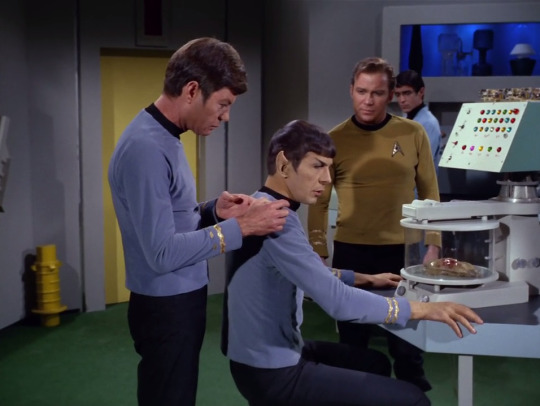
Rather incongruous with the image of the pop-culture giant we know it as today, wouldn’t you think?
So what happened?
As it turns out, Star Trek had enough episodes (thanks to the third season) to enter syndication. Desilu Productions, which at that point had become Paramount, licensed the syndication rights in order to turn a profit, and reruns of Star Trek began airing in late 1969.
In syndication, Star Trek became a cult classic, finding a larger audience on reruns than it had during its original run. The show, which was airing in the afternoons and early evenings, was attracting a young demographic, and, ironically, Star Trek became known as ‘the show that wouldn’t die’. By 1970, Star Trek was boosting Paramount’s ratings, and becoming extremely popular. In January of 1972, over 3,000 fans attended the first Star Trek convention in New York City, kicking off a previously unheard-of trend of organized fan gatherings where they could buy merchandise, meet cast and crew, and screen episodes of the show. These people, coming to be known as ‘trekkies’, took pride in their knowledge and extreme love for this series, which was becoming renowned for being a smart, heartfelt science fiction show that had been cancelled too early.
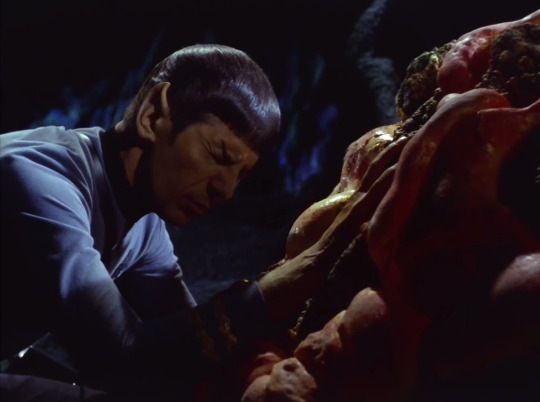
17 years after Star Trek was cancelled and started reruns, Star Trek became the most popular syndicated show of all time. By 1987, Paramount was bringing in $1 million per episode, and by 1994, reruns were still airing in over 90% of the United States of America.
The rest is history.
It has been over fifty years since Gene Roddenberry’s vision of a wagon train to the stars first took flight, and it was a hard battle fought to get as far as it did. Never before had a show garnered the support and devoted love from a fanbase, never had it inspired such huge leaps and bounds in television and fandom alike. Never had a television show meant so much to so many, and continued to do so well past its end.
For a show that struggled through a third season, it seems incredible that Star Trek still holds the weight that it does today. The show that wouldn’t die gained new life beyond the grave, still capturing people’s attention decades after it was cancelled, growing to become one of the best known and best loved television shows ever made.
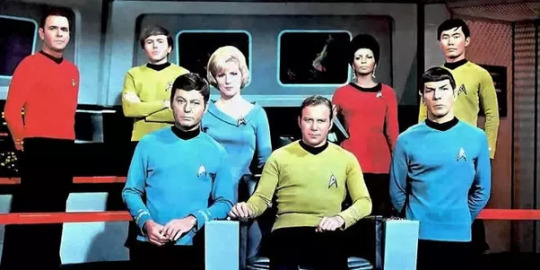
Against all odds, Star Trek lives on, remaining one of the greatest television shows of all time, for very good reason.
Join me for one last article as next time we take one last look at Star Trek in our Final Thoughts. If you have any thoughts, questions, suggestions, recommendations, or just want to say hi, don’t forget to leave an ask! Thank you all so much for reading, and I hope to see you in the next article.
#Star Trek: The Original Series#Star Trek#Television#TV#TV-PG#60s#Drama#Action#Adventure#Science Fiction#Sci-Fi#William Shatner#Leonard Nimoy#DeForest Kelley#James Doohan#Nichelle Nichols#George Takei#Walter Koenig#Majel Barrett#Gene Roddenberry
55 notes
·
View notes
Photo

Kevin Weeks is an Irish-American former mobster and longtime friend and mob lieutenant to Whitey Bulger, the infamous boss of the Winter Hill Gang, a crime family based in the Winter Hill neighborhood in Somerville, Massachusetts. Kevin Weeks was born in South Boston, Massachusetts on March 21, 1956, to a working-class family of Irish and Welsh descent. He was the fifth child in a family of six and grew up in the Old Colony Housing Project at 8 Pilsudski Way, apartment 554. His father, John Weeks Sr., originally hailed from Brooklyn, New York. He changed tires for a living and later obtained a position with the Boston Housing Authority. John Sr. was a WWII veteran and had served in the infantry; he also had fought as a professional middleweight boxer (this may be incorrect as no record of him exists in BoxRec). When he was 26, he married Margaret, who was from Boston. A full-time homemaker, she suffered from severe arthritis and went about the family's tenement on crutches. Throughout high school, Weeks was involved in extra-curricular activities. When he wasn't boxing, he was on a team traveling to swim meets all over New England. His memoirs vividly describe how the busing controversy transformed the previously comparatively peaceful South Boston high schools into hotbeds of gang warfare. Weeks was released from Federal prison in early 2005. He collaborated with journalist Phyllis Karas (of People magazine). Weeks's account of his life with Bulger and Flemmi was published in March 2006. He was a star witness at Connolly's 2008 trial on state charges of murdering former World Jai Alai president John Callahan, as well as at Bulger's 2013 trial on racketeering charges two years after Bulger was finally captured. At the latter trial, Bulger lost his composure when Weeks called him a rat and the two former compatriots almost came to blows. #whiteybulger #whitey #jamesbulger #jimmybulger #blackmass #johnnydepp #kevinweekes #winterhill #winterhillgang #bostonmafia #irishmob🍀 #irishmafia #irishcarbombs #southie #southend #boston #freddiegeas #riflemanflemmi #fbi #informant https://www.instagram.com/p/CRAt6NuFpU5/?utm_medium=tumblr
#whiteybulger#whitey#jamesbulger#jimmybulger#blackmass#johnnydepp#kevinweekes#winterhill#winterhillgang#bostonmafia#irishmob🍀#irishmafia#irishcarbombs#southie#southend#boston#freddiegeas#riflemanflemmi#fbi#informant
1 note
·
View note
Text
Fallout game set in the ruins of New York City but instead of the whole “modern city of the future now in ruin” that they did with DC and Boston instead it’s become the hive of a stratified set of very diverse social classes with a strong underworld of gang warfare that takes many heavy tones and influences from the historical 19th-century gang warfare and social, ethnic and political climate of the city at the time
Think Necromunda from 40k mixed up with the film Gangs of New York (granted it’s a shite film but it fits the bill at least aesthetically for what I’m going for)
88 notes
·
View notes
Text
They Never Teach You How to Stop
Rarely do I lack the words to express myself. Perhaps this reflects my failure to maintain my journal consistently throughout 2020. Here goes an honest attempt to capture and document my mental state and the fatigue of Covid, the inertia of this shelter-in-place, the anxiety of this political crisis we face as a nation, the pressure of being a 1L in law school against the backdrop of civil unrest and Justice Ginsburg’s death, coming out - my dad told me he was disappointed -, the possible erosion of my relationship with someone I love, and this feeling of absolute dread and resentment for a system that continuously fails my and future generations (robbing us of a social contract that promised life, liberty, and the pursuit of happiness), among many other things I’m too tired to consider. When did we accept a $0 baseline as the American Dream? Oh, to be debt free - free from this punishment for having pursued an education. Stifling the educated to prevent them (myself included) from organizing and mobilizing the masses so we can supplant this system with a better one is the overall objective of the oppressive class (read: Pedagogy of the Oppressed); it’s the conflict between the bourgeois and the proletariat. The proletariat has swallowed the middle class, leaving only the ruling class. I am essentially on autopilot, forcing myself to go through the motions so I can survive another day. I know others join me in this mental gymnastics of unparalleled proportions, one social scientists and medical researchers will soon study and subsequently publish their findings in an attempt to explain the unexplainable. Despite a lack of air circulation, we are breathing history; the constitution, like our societal norms, must adapt accordingly. Judge Barrett: there is no place for originalism. While I seldom admit weakness or an inability to manage life’s curveballs, this series of unfortunate events seems almost too much to bear.
And yet somehow I continue to find the energy to submit assignments due at 11:59 p.m., write this post at 1:38 a.m., “sleep”, wake at 7 a.m. so I can read and prepare (last minute!) the assigned material leading into my torts or contracts class. I find the energy to text my boyfriend (or ex-boyfriend) so I can attempt to salvage the real and genuine connection we have, cook elaborate meals to find some solace, wrestle with whether or not to hit my yoga mat (I don’t), apply to a fellowship for the school year and summer internships, prepare my dual citizenship paperwork, manage a campaign for two progressive politicians, and listen to music in an attempt to stay sane . . . ~*Queues John Mayer’s “War of My Life” and “Stop This Train”*~ . . . I realize I have to be kinder to myself, give credit where credit is due. I hate feeling self-congratulatory though.
Mostly, I am too afraid of the repercussions if I stop moving at a mile/minute, that I can just work away the pain and be the superhuman who numbs himself from the low-grade depression and nervous breakdown. My body tells me to slow down, as evidenced by the grinding of my teeth, but I take on more responsibility because people rely on me. I must show up. I am a masochist in that way. This is what I signed up for and I’ll be damned if I don’t carry through on my promise to do the work. Pieces of my soul scattered about like Horcruxes, though they’re pure, not evil, so I hope nobody resolves to destroy them.
My mind rarely rests. It’s 3:08 a.m., one of the lonelier hours where night meets morning; it’s the hour for and of intense introspection. It makes you consider pulling an all-nighter, one you reserve for an “important” school or work deadline. We always put our personal lives on the back-burner. 3 a.m. sets the tone for a potentially awful day. But that doesn’t matter right now. I’m letting some of my favorite albums play in the background: Joni Mitchell’s Blue, Mac Miller’s Circles, Rhye’s Blood, Alicia Keys’ ALICIA, Coldplay’s Ghost Stories, Frank Ocean’s Blonde, Miley Cyrus’ Dead Petz in addition to other playlists, Tiny Desk performances, and tracks (I unearthed last week, like When It’s Over by Sugar Ray). I need to feel something. I need to feel anything. I need to feel everything. We experience such a broad spectrum of emotions throughout the day that we lose track of if we don’t pause to absorb them. Music reinforces empathy; it releases dopamine.
I spent the past two hours reading through old journals and posts, as scattered as they were, on a wide range of topics: poems I had written about falling in and out love, anecdotes about my world travels, and entries on personal, political, and professional epiphanies. The other night I found one of my favorites, a previous post from my time living in Indonesia, centering on the dualities of technology. It resonated with me more than the others. To summarize, I wrote about my tendency to equate the Internet with a sense of interconnectedness (shoutout to Tumblr for being my digital journal; to Twitter for being a place of comedy and revolution; to Instagram for curating my *aesthetic*; to Facebook where I track my family’s accomplishments and connect with travel buddies displaced around the globe all searching for a home). And yet I feel incredibly lonely and disconnected whenever I spend too much time using technology, so much so that I set screen time limitations on my phone recently to curtail this obsession with constant communication and information gathering. Trump and Biden admitted that it’s unlikely we’ll know the results of the election on November 3rd during their first presidential debate. Push notifications don’t allow us to learn of trauma within the comforts of our own homes. I’m already fearing where I will be when that news breaks.
This global pandemic and indefinite shutdown of the world (economy) undeniably exacerbates these feelings. This is some personal and collective turmoil. But I was complicit in the endless scrolling and swiping of faces and places long before Covid-19. Instead of choosing to interact with my direct environment (today’s research links this behavior to the same levels of depression one feels when they play slot machines), I am still an active on all these platforms, participating the least in the most tangible one: my physical life. I am tired of pretending. I am tired of being tired. I am tired of embodying fake energy to exist in systems that fail me. I am tired of the quagmire. Like Anaïs Nin, I must be a mermaid [because] I have no fear of depths and a great fear of shallow living. This particular excerpt from that 2016 entry was difficult for me to read: “The fantasy of what could have been if a certain plan had unfolded will haunt you forever if you do not come to peace with the reality of the situation. I hope you come to terms with reality.” I am not at peace with my current reality. But is anyone?
It’s a bit surreal for my peers to have suddenly started caring about international relations theory. It’s transported me back to my 2012 IR lecture at Northeastern: are you a constructivist or a feminist? Realist or liberalist? Neo? Marxist? The one no one wants you to talk about. Absent upward mobility, this is class warfare. But I cannot be “a singular expression of myself . . . there are too many parts, too many spaces, too many manifestations, too many lines, too many curves, too many troubles, too many journeys, too many mountains, too many rivers” . . . It feels like America’s wake-up call. But I know people will retreat into the comforts of capitalism if Biden wins and, well, we all enter uncharted waters together if the Electoral College re-elects #45. For those who weren’t paying attention: the world is multipolar and we are not the hegemon. Norms matter. People tend to be self-interested and shortsighted. Look to the past in order to understand the future. History, as the old adage goes, repeats itself. Once a cheater, always a cheater. Taxation without representation. Indoctrination. Welcome to the language of political discourse. Students of IR and polisci have long awaited your participation. Too little too late? Plot twist: it’s a lifelong commitment. You must continue to engage irrespective of the election outcome or else we will regress just as quickly as we progress. Now dive into international human rights treaties (International Covenant on Civil & Political Rights; International Covenant on Economic, Social, and Cultural Rights), political refugees, FGM. No one said it wasn’t dismal. But it’s important. We need buy-in.
While I am grateful for the continuation of my education, for this extended time with family, for this opportunity to be a campaign manager for two local progressive candidates (driving to Boston to pick up revised yard signs as proof that the work never stops), it would be remiss of me, however, not to admit that I am lonely: I am buried in my books, in the depressing news both nationally and globally, and in precedent-setting Supreme Court cases (sometimes for the worst, e.g. against the preservation of our environment). In my nonexistent free time I work on political asylum cases, essentially creating an enforceability framework of international law, for people fleeing country conditions so unthinkable (the irony of that work when my country falls greater into authoritarianism and oligarchy is not lost on me). I am fulfilling my dream of becoming a human rights lawyer which stems back to middle school. I saw Things I Imagined (thank you Solange). I have held an original copy of the Declaration of Independence that we sent to the House of Lords in 1778 and the Human Rights Act of 1998 while visiting the U.K. Parliamentary Archives as an intern for a Member of Parliament. This success terrifies and exhausts me; it also oxygenizes and saves me. Every decision, every sacrifice, has led me to this point.
“It’s the choosing that’s important, isn’t it?,” Lois Lowry of The Giver rhetorically asks. This post is not intended to be woe is me! I am fortunate to be in this position, to have this vantage point at such an early age, and I understand the whole is greater than the sum of the parts. My life has purpose. I am committed to the work that transcends boundaries; it is larger than life itself. It provides a unique perspective. But it makes it difficult to coexist with people so preoccupied in the drama they create in their lives and the general shallowness of the world we live. It feels like there is no option to pump the brakes on any of this work, especially in light of our current climate, and that pressure oftentimes feels insurmountable. Time is of the essence. It feels, whether true or not, that hardly anyone relates to my experience, so if I don’t carve out this time to write about it, then I am neither recording nor processing it.
Tonight, in between preparing tomorrow’s coursework, I realize that I have an unprecedented number of questions about life, which startles me because typically I have the answers or at least have a goal in mind that launches me into the next phase of life or contextualizes the current one. These goals, often rooted in this capitalistic framework, in this falsity of “needing” to advance my career as a means of helping people, distract me from asking myself the existential questions, the reasons for why we live and what we fundamentally want our systems to look like; they have distracted me from real grassroots community organizing until now. They distract me from the fact that, like John Mayer, I don’t know which walls to smash; similarly, I don’t know which train to board. Right now feels like we are living through impossible and hopeless times and I don’t want to placate myself into thinking otherwise despite my relatively optimistic outlook on life. As we face catastrophic circumstances – the consequences of this election and climate change (famine, refugees, lack of resources) – I do not want to live in perpetual sadness. I am searching for clarity and direction so I can step into a better, fuller version of myself.
It’s now 3:33 a.m. Here is the list of questions that I have often asked myself in different stages of life, but recently, until now, I have not been willing to confront for fear that I might not be able to answers them. But I owe it to myself to pose them here so I can have the overdue conversation, the one I know leads me to better understanding myself:
Are you happy? Why or why not?
What do you want the future to hold? What groundwork are you going to do to ensure it happens?
What does your ideal day/week/month/year/decade look like? Why?
With whom do you want to spend your days? Why?
Who do you love and care about? Have you told people you care about that you love them? Does love and vulnerability scare you?
What do you expect of people – of yourself, of your partner, of your family, and of your friends? Should you have those expectations? Why or why not?
What do you feel and why?
What relaxes you? What scares you? What brings you joy?
What do you want to improve? Why?
What do you want to forgive yourself for and why?
Does the desire to reinvent yourself diminish your ability to be present?
Do you have a greater fear of failure or success? Why?
How do you escape the confines of this broken system? How do you break from the guilt of participation in it and having benefited from it?
How do we reconcile our daily lives with the fact that we’re living through an extinction event? This one comes from my friend (hi Jeanne) and a podcast she listened to recently.
How do you help people? How do you help yourself? Are you pouring from an empty cup?
How will you find joy in your everyday responsibilities, in the mission you have chosen for yourself? What, if any, will be the warning signs to walk away from this work, in part or in its entirety? Without being a martyr, do you believe in dying for the cause?
So here are some of the lessons I have learned during this quarantine/past year:
“I’ve Got Dreams to Remember,” so do not take your eyes off them. Chasing paper does not bring you happiness.
Be autonomous, particularly in your professional life.
Focus on values instead of accolades.
Do everything with intention and honest energy.
Listen to Tracy Chapman’s “Crossroads” & Talkin’ Bout a Revolution for an energy boost and reminder that other revolutionaries have shared and continue to share your fervent passion . . . “I’m trying to protect what I keep inside, all the reasons why I live my life” . . . When self-doubt nearly cripples you and you yearn a few minutes to run away when in reality you can’t escape your responsibilities, go for a drive and queue up “Fast Car” . . . “I got no plans, I ain’t going nowhere, so take your fast car and keep on driving.”
With that said, take every opportunity to travel (you can take the work with you if absolutely necessary). Go to Italy. Buy the concert ticket and lose yourself in the moment. Remember that solo excursions are equally as important as collective ones. But, from personal experience, you prefer the company. Find the balance.
Detach from the numbers people keep trying to assign to measure your personhood.
Closely examine the people in your inner circle and ask them for help when you need it.
“And life is just too short to keep playing the game . . . because if you really want somebody [or something], you’ll figure it out later, or else you will just spend the rest of the night with a BlackBerry on your chest hoping it goes *vibration, vibration*” (John Mayer’s Edge of Desire) . . . so love fiercely and unapologetically.
Be specific.
Go to therapy even when life is good.
#reflection#covid#quarantine#late nights#music#revolution#diary#politics#john mayer#alicia keys#tracy chapman#love#dear diary#travel#writing#personal#mental health
8 notes
·
View notes
Text
Tiptoeing through the “Code of Conduct” guest cast.
Catherine Bell as Marine Lieutenant Colonel Sarah "Mac" MacKenzie
Last seen in deep conversation with Harm in "Let Fate Decide" to open the season.
Caleb Castille as FBI Special Agent Devin Rountree
After "Watch Over Me" and Fortune Favors the Brave" in recent weeks, Castille is back for a third episode.
Don Wallace as Navy SEAL Senior Chief Frank Wallace
Wallace was last seen in "Alsiyadun" in the boatshed (as a guest, not on the wrong side of the table).
Juan Riedinger as Navy Chief Petty Officer Thomas Argento
Played Teo in Good Behavior, Joe Dupree in Claws and Dodger in Riverdale.
Appeared in episodes of Intelligence, Blood Ties, The L Word, Bionic Woman (2007 with Miguel Ferrer), Psych, Smallville, Supernatural, Fringe, Human Target, Fairly Legal, Sanctuary, Continuum, Covert Affairs, Narcos, Zoo, Motive and Lethal Weapon.
T.J. Linnard as Special Officer First Class Adam Barr
Played Logan Chase in "The Tie That Binds" on NCIS in season 14 (the terrific holiday episode that season). Was Vince Hanna on Rosewood and Evan Speck in Good Trouble. Was in episodes of The Guiding Light, Boardwalk Empire, CSI: NY, Looking, Justified, Resurrection, Code Black, Minority Report, Stitchers and 9-1-1.
Kendall Johnson as Special Warfare Operator First Class Malcolm Kendricks
Appeared Charles "Shorty" Goggins in the "Spies and Lies" episode this season of NCIS: New Orleans. Was Kendall in Sexless.
Myk Watford as Navy Petty Officer William Moffat
Played Mike Hoffman, Astrid's dad in "The Fifth Man" in season five. A rare return as a different character for this show.
Ali Saam as Khalil
Was in episodes of The Affair, Sorry for Your Loss and SEAL Team.
Arshia Mandavi as Jawan Yusufi
Teen actor.
Chris Lamica as Navy Petty Officer Second Class Michael Cole
Guest starred in episodes of Lucifer, The Rookie and SWAT.
Marshall Manesh as Older Afghan Man
Played Mr. Zamir in Will & Grace's first incarnation, Wally in Andy Barker, P.I., Ranjit in How I Met Your Mother, Rafiq Massoud Sr. in The Brink and Virgil in Cooper Barrett's Guide to Surviving Life. Played two different characters in JAG – a cleric in "Head to Toe" in season seven and Habib in "Heart of Darkness" in season ten.
Appeared in episodes of High Incident, Diagnosis Murder, Suddenly Susan, Brooklyn South, Pacific Blue, Work With Me, The X-Files, Nash Bridges, City of Angels, Law & Order: SVU, The Huntress, Judging Amy, The Division, Alias, NYPD Blue, Entourage, Scrubs, Joey, Line of Fire, Boston Legal, Burn Notice, Journeyman, Raising the Bar, Valentine, ER, Prison Break, The Ex List, Persons Unknown, Svetlana, Love Bites, Guys with Kids, The League, Hot in Cleveland, Good Luck Charlie, Baskets, Madam Secretary, Speechless and Good Girls.
Sumeet Dang as Yusufzai
Appeared in a number of short flims.
Written and Directed by: Frank Military wrote/co-wrote "Little Angels", "Deliverance", "Lockup", "The Job", "Greed", "Betrayal", "Crimeleon", "Vengeance", "Out of the Past" Part One, "Rude Awakenings" Part Two, season four’s finale "Descent", season five’s premiere "Ascension", "Allegiance", "Spoils of War", "Black Budget", SEAL Hunter", "Rage", "Unspoken", "Unlocked Mind", "Revenge Deferred", "The Seventh Child", "Crazy Train", "Uncaged" (first-half of the season eight finale), "The Silo", "Monster", "Line in the Sand" (first-half of the season nine finale), season ten opener "To Live and Die in Mexico", "The Patton Project", "Better Angels", "False Flag" (the season 11 finale) and "A Bloody Brilliant Plan".
Frank Military directed "Spoils of War", "Rage", "The Seventh Child", "Uncaged", "A Line in the Sand" and "To Live and Die in Mexico" – all episodes he wrote – and "Answers" which he did not.
And this is the abrupt end to season 11. Hope the show is back sooner rather than later - everyone needs some harmless to them explosions in their lives.

25 notes
·
View notes